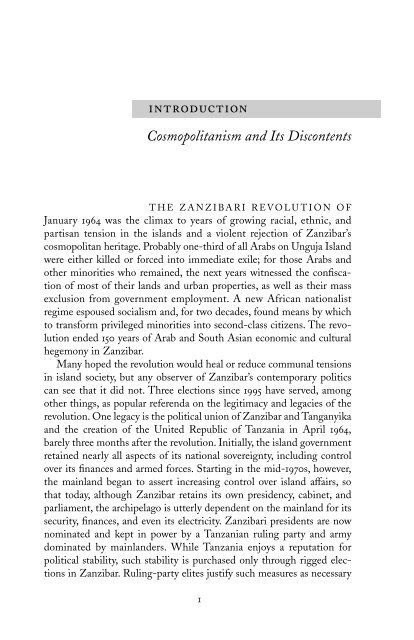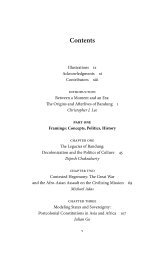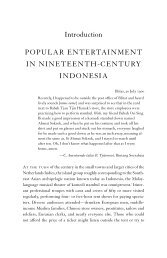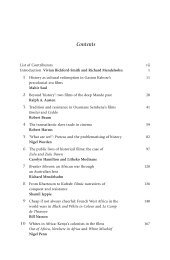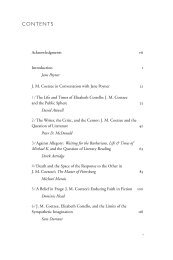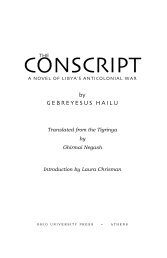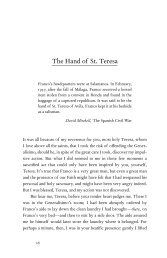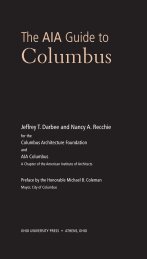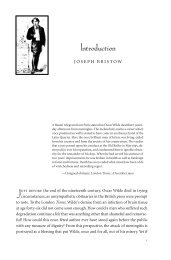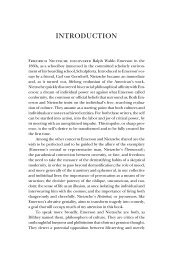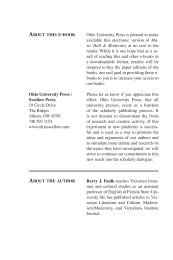Race, Revolution, and the Struggle for Human Rights in Zanzibar ...
Race, Revolution, and the Struggle for Human Rights in Zanzibar ...
Race, Revolution, and the Struggle for Human Rights in Zanzibar ...
Create successful ePaper yourself
Turn your PDF publications into a flip-book with our unique Google optimized e-Paper software.
<strong>in</strong>troduction<br />
Cosmopolitanism <strong>and</strong> Its Discontents<br />
THE ZANZIBARI REVOLUTION OF<br />
January 1964 was <strong>the</strong> climax to years of grow<strong>in</strong>g racial, ethnic, <strong>and</strong><br />
partisan tension <strong>in</strong> <strong>the</strong> isl<strong>and</strong>s <strong>and</strong> a violent rejection of <strong>Zanzibar</strong>’s<br />
cosmopolitan heritage. Probably one-third of all Arabs on Unguja Isl<strong>and</strong><br />
were ei<strong>the</strong>r killed or <strong>for</strong>ced <strong>in</strong>to immediate exile; <strong>for</strong> those Arabs <strong>and</strong><br />
o<strong>the</strong>r m<strong>in</strong>orities who rema<strong>in</strong>ed, <strong>the</strong> next years witnessed <strong>the</strong> confiscation<br />
of most of <strong>the</strong>ir l<strong>and</strong>s <strong>and</strong> urban properties, as well as <strong>the</strong>ir mass<br />
exclusion from government employment. A new African nationalist<br />
regime espoused socialism <strong>and</strong>, <strong>for</strong> two decades, found means by which<br />
to trans<strong>for</strong>m privileged m<strong>in</strong>orities <strong>in</strong>to second-class citizens. The revolution<br />
ended 150 years of Arab <strong>and</strong> South Asian economic <strong>and</strong> cultural<br />
hegemony <strong>in</strong> <strong>Zanzibar</strong>.<br />
Many hoped <strong>the</strong> revolution would heal or reduce communal tensions<br />
<strong>in</strong> isl<strong>and</strong> society, but any observer of <strong>Zanzibar</strong>’s contemporary politics<br />
can see that it did not. Three elections s<strong>in</strong>ce 1995 have served, among<br />
o<strong>the</strong>r th<strong>in</strong>gs, as popular referenda on <strong>the</strong> legitimacy <strong>and</strong> legacies of <strong>the</strong><br />
revolution. One legacy is <strong>the</strong> political union of <strong>Zanzibar</strong> <strong>and</strong> Tanganyika<br />
<strong>and</strong> <strong>the</strong> creation of <strong>the</strong> United Republic of Tanzania <strong>in</strong> April 1964,<br />
barely three months after <strong>the</strong> revolution. Initially, <strong>the</strong> isl<strong>and</strong> government<br />
reta<strong>in</strong>ed nearly all aspects of its national sovereignty, <strong>in</strong>clud<strong>in</strong>g control<br />
over its f<strong>in</strong>ances <strong>and</strong> armed <strong>for</strong>ces. Start<strong>in</strong>g <strong>in</strong> <strong>the</strong> mid-1970s, however,<br />
<strong>the</strong> ma<strong>in</strong>l<strong>and</strong> began to assert <strong>in</strong>creas<strong>in</strong>g control over isl<strong>and</strong> affairs, so<br />
that today, although <strong>Zanzibar</strong> reta<strong>in</strong>s its own presidency, cab<strong>in</strong>et, <strong>and</strong><br />
parliament, <strong>the</strong> archipelago is utterly dependent on <strong>the</strong> ma<strong>in</strong>l<strong>and</strong> <strong>for</strong> its<br />
security, f<strong>in</strong>ances, <strong>and</strong> even its electricity. <strong>Zanzibar</strong>i presidents are now<br />
nom<strong>in</strong>ated <strong>and</strong> kept <strong>in</strong> power by a Tanzanian rul<strong>in</strong>g party <strong>and</strong> army<br />
dom<strong>in</strong>ated by ma<strong>in</strong>l<strong>and</strong>ers. While Tanzania enjoys a reputation <strong>for</strong><br />
political stability, such stability is purchased only through rigged elections<br />
<strong>in</strong> <strong>Zanzibar</strong>. Rul<strong>in</strong>g-party elites justify such measures as necessary<br />
1
to preserve <strong>the</strong> revolution <strong>and</strong> to ensure <strong>the</strong> isl<strong>and</strong>s rema<strong>in</strong> part of<br />
Tanzania.<br />
Thus, <strong>Zanzibar</strong> constitutes by far <strong>the</strong> most turbulent part of Tanzania<br />
today, a direct result of <strong>the</strong> revolution <strong>in</strong> <strong>the</strong> 1960s. Officials of<br />
Tanzania’s rul<strong>in</strong>g party recognize that, if <strong>the</strong>y face a serious political challenge,<br />
<strong>the</strong>y do so <strong>in</strong> <strong>Zanzibar</strong>. S<strong>in</strong>ce <strong>the</strong> 1990s, <strong>the</strong> ongo<strong>in</strong>g political<br />
impasse <strong>in</strong> <strong>the</strong> isl<strong>and</strong>s has resulted <strong>in</strong> violent crackdowns on political<br />
demonstrations <strong>and</strong> <strong>the</strong> flight of thous<strong>and</strong>s of <strong>Zanzibar</strong>i refugees. The<br />
<strong>Zanzibar</strong>i “crisis” has called <strong>in</strong>to question Tanzania’s respect <strong>for</strong><br />
human rights: does Chama Cha Map<strong>in</strong>duzi (CCM), mean<strong>in</strong>g “Party of<br />
<strong>Revolution</strong>” <strong>in</strong> Swahili, actually <strong>in</strong>tend to allow opposition parties to<br />
w<strong>in</strong> elections, or are <strong>the</strong>y permitted to exist merely to appease Western<br />
donors?<br />
memory communities<br />
How <strong>Zanzibar</strong>is remember <strong>the</strong> revolution—as ei<strong>the</strong>r <strong>the</strong> orig<strong>in</strong>al s<strong>in</strong> or<br />
<strong>the</strong> triumph of <strong>the</strong> <strong>in</strong>dependence era—often determ<strong>in</strong>es whom <strong>the</strong>y call<br />
<strong>the</strong>ir friends, with whom <strong>the</strong>y share a cup of coffee, or whom <strong>the</strong>y welcome<br />
to <strong>the</strong>ir homes as <strong>in</strong>-laws. Many <strong>Zanzibar</strong>is cont<strong>in</strong>ue to trace <strong>the</strong>ir<br />
present <strong>for</strong>tunes to <strong>the</strong> revolution; it assumes center stage <strong>in</strong> discussions<br />
of how present conditions came to be. Defenders of <strong>the</strong> revolution claim<br />
it was good <strong>for</strong> Africans <strong>and</strong> describe <strong>the</strong> violence <strong>in</strong> 1964 <strong>and</strong> afterward<br />
as m<strong>in</strong>imal <strong>and</strong> justified <strong>in</strong> order to right a century of wrongs. They often<br />
speak <strong>the</strong> language of African nationalism, whereas <strong>the</strong>ir opponents espouse<br />
<strong>the</strong> language of human rights <strong>and</strong> regard <strong>the</strong> violence as nei<strong>the</strong>r<br />
m<strong>in</strong>imal nor justified. These latter remember <strong>the</strong> revolution as a long era<br />
of arrests, empty shops, <strong>and</strong> an ever-present atmosphere of isolation <strong>and</strong><br />
fear. They claim <strong>the</strong> revolution reversed <strong>the</strong> social <strong>and</strong> economic development<br />
of <strong>the</strong> previous century <strong>and</strong> reduced what was once a proud <strong>and</strong><br />
<strong>in</strong>dependent sultanate <strong>in</strong>to a powerless appendage of <strong>the</strong> ma<strong>in</strong>l<strong>and</strong>.<br />
Politics <strong>in</strong> <strong>the</strong> isl<strong>and</strong>s is not merely a contest common with<strong>in</strong> contemporary<br />
Africa over such issues as government corruption <strong>and</strong> promises<br />
kept or broken; ra<strong>the</strong>r, it is about memory <strong>and</strong> identity. The revolution<br />
<strong>in</strong> <strong>the</strong> 1960s, <strong>in</strong> <strong>the</strong> name of African unity, largely repudiated <strong>Zanzibar</strong>’s<br />
cosmopolitan past <strong>and</strong> ended <strong>the</strong> isl<strong>and</strong>s’ <strong>in</strong>dependence. It promoted an<br />
African nationalist discourse of racial grievance, which, when wedded to<br />
socialist ideals, justified an assault on <strong>the</strong> wealth <strong>and</strong> exclusivity of m<strong>in</strong>ority<br />
communities <strong>and</strong> <strong>the</strong> punishment of Pemba as an isl<strong>and</strong> of<br />
“counterrevolutionaries.” Opponents of <strong>the</strong> revolution, meanwhile, embrace<br />
<strong>Zanzibar</strong>’s multicultural heritage <strong>and</strong> <strong>the</strong> idea that such a heritage<br />
2 <strong>in</strong>troduction
makes isl<strong>and</strong>ers a unique people, possess<strong>in</strong>g a set of <strong>in</strong>terests that ought<br />
to be defended with<strong>in</strong> <strong>the</strong> Tanzanian union. In <strong>the</strong>ir ef<strong>for</strong>ts to rally isl<strong>and</strong>ers<br />
of all backgrounds aga<strong>in</strong>st <strong>the</strong> rul<strong>in</strong>g party, <strong>the</strong>y employ a language<br />
of human rights that has atta<strong>in</strong>ed a global currency as widespread as that<br />
of socialism <strong>and</strong> of African nationalism <strong>in</strong> <strong>the</strong> 1960s. Thus, not only do<br />
<strong>Zanzibar</strong>is contest <strong>the</strong> legacy of <strong>the</strong> revolution <strong>in</strong> <strong>the</strong>ir lives, <strong>the</strong>y also<br />
disagree on <strong>the</strong> language through which it is to be understood.<br />
The two memoirs conta<strong>in</strong>ed <strong>in</strong> this volume may be read as oppos<strong>in</strong>g<br />
arguments <strong>for</strong> <strong>and</strong> aga<strong>in</strong>st <strong>the</strong> revolution; as such, <strong>the</strong>y provide rare <strong>and</strong><br />
contradictory <strong>in</strong>sights <strong>in</strong>to Tanzania’s postcolonial history <strong>and</strong> current<br />
political stalemate. They demonstrate how conflicts with<strong>in</strong> <strong>Zanzibar</strong><br />
have become issues of national importance <strong>for</strong> Tanzania. The memoirs<br />
also demonstrate <strong>the</strong> differences between <strong>the</strong> language of socialism <strong>and</strong><br />
that of human rights. Ali Sultan Issa supports <strong>the</strong> revolution on socialist<br />
pr<strong>in</strong>ciple as an event that liberated isl<strong>and</strong>ers from a colonial system of class<br />
exploitation. Seif Sharif Hamad, however, regards <strong>the</strong> revolution as a disaster<br />
<strong>in</strong> terms of human rights, an event to be regretted deeply. While<br />
each man served <strong>for</strong> years as a m<strong>in</strong>ister <strong>in</strong> <strong>the</strong> revolutionary regime, each<br />
was also imprisoned <strong>and</strong> <strong>for</strong>ced out of <strong>the</strong> rul<strong>in</strong>g party. Nei<strong>the</strong>r espouses<br />
African nationalism nor advocates <strong>the</strong> politics of race. Each, <strong>in</strong> fact,<br />
specifically deplores <strong>the</strong> habit of some <strong>Zanzibar</strong>i politicians to manipulate<br />
racial or ethnic identities <strong>in</strong> order to achieve political ends. They<br />
both, fur<strong>the</strong>rmore, dispute official claims made <strong>for</strong> decades <strong>in</strong> <strong>the</strong> schools,<br />
<strong>in</strong> <strong>the</strong> media, <strong>and</strong> at public rallies that, s<strong>in</strong>ce 1964, <strong>the</strong> isl<strong>and</strong>s have seen<br />
rapid social <strong>and</strong> economic development.<br />
Official claims that reflect African nationalist currents of thought<br />
should be understood <strong>in</strong> order to grasp <strong>the</strong> historical <strong>and</strong> <strong>in</strong>tellectual<br />
context of <strong>the</strong> memoirs presented here. Salm<strong>in</strong> Amour, who served as<br />
president of <strong>Zanzibar</strong> (1990–2000), completed his doctoral dissertation<br />
at Karl Marx Party College <strong>in</strong> East Berl<strong>in</strong> <strong>in</strong> 1986. “<strong>Zanzibar</strong> <strong>in</strong> <strong>the</strong> earliest<br />
days,” he writes, was “a totally classless society.” Un<strong>for</strong>tunately, it was<br />
not “left to prosper smoothly over time.” 1 Arabs came <strong>and</strong> <strong>in</strong>troduced<br />
slavery, someth<strong>in</strong>g Amour claims was until <strong>the</strong>n completely unknown,<br />
ignor<strong>in</strong>g considerable historical evidence to <strong>the</strong> contrary. 2 Arabs denied<br />
Africans <strong>the</strong> chance to evolve <strong>the</strong>ir own <strong>for</strong>ms of socialism: had Africans<br />
“been left to follow <strong>the</strong>ir life styles smoothly,” <strong>the</strong>y would have developed<br />
“<strong>in</strong>to a higher <strong>for</strong>m of <strong>the</strong> African collective mode of liv<strong>in</strong>g.” 3 Africans<br />
possessed no desires to exploit one ano<strong>the</strong>r, <strong>and</strong> it was only <strong>the</strong> <strong>in</strong>filtration<br />
of <strong>for</strong>eigners that produced “evils” such as class divisions <strong>in</strong> <strong>the</strong> isl<strong>and</strong>s. 4<br />
Amour’s portrayal of precolonial society <strong>in</strong> <strong>Zanzibar</strong> as protosocialist<br />
<strong>and</strong> egalitarian is familiar; it reflects <strong>the</strong> <strong>in</strong>tellectual <strong>in</strong>fluence of Julius<br />
Cosmopolitanism <strong>and</strong> Its Discontents 3
Nyerere <strong>and</strong> his vision of African “familyhood” as <strong>the</strong> basis <strong>for</strong> socialism<br />
<strong>in</strong> Tanzania. It also serves very important functions <strong>in</strong> contests over memory<br />
more specific to <strong>Zanzibar</strong>. By assert<strong>in</strong>g <strong>the</strong> fundamentally moral<br />
nature of precolonial African society, Amour <strong>in</strong>verts dist<strong>in</strong>ctions commonly<br />
drawn <strong>in</strong> coastal East Africa between “savagery” <strong>and</strong> “civilization.” 5<br />
Amour does not reject <strong>the</strong> language of civilization but merely recasts <strong>the</strong><br />
assigned roles, with Africans now represent<strong>in</strong>g civilization <strong>and</strong> Arabs—<br />
through <strong>the</strong>ir role <strong>in</strong> <strong>the</strong> slave trade—<strong>the</strong> <strong>for</strong>ces of savagery. Amour’s<br />
image of <strong>the</strong> precolonial past makes possible his claim that <strong>the</strong> revolution<br />
restored isl<strong>and</strong> society to its <strong>for</strong>mer moral equilibrium <strong>and</strong> reestablished<br />
a society of tolerance <strong>and</strong> mutual respect. Amour’s claims thus reflect<br />
what Liisa Malkki observed about oral histories <strong>in</strong> general: <strong>the</strong>y represent<br />
“not only a description of <strong>the</strong> past, nor even merely an evaluation of<br />
<strong>the</strong> past, but a subversive recast<strong>in</strong>g <strong>and</strong> re<strong>in</strong>terpretation of it <strong>in</strong> fundamentally<br />
moral terms.” 6 On moral grounds, Amour <strong>and</strong> o<strong>the</strong>r African<br />
nationalists award Africans status as an advanced people, justify <strong>the</strong> revolution,<br />
<strong>and</strong> reject <strong>the</strong> worth<strong>in</strong>ess of <strong>Zanzibar</strong>’s mixed cultural heritage.<br />
The argument aga<strong>in</strong>st cosmopolitanism is carried fur<strong>the</strong>r <strong>in</strong> Omar<br />
Mapuri’s The 1964 <strong>Revolution</strong>: Achievements <strong>and</strong> Prospects, which is perhaps<br />
<strong>the</strong> most significant clue to underst<strong>and</strong><strong>in</strong>g <strong>the</strong> extremist edge of racial<br />
politics <strong>in</strong> contemporary <strong>Zanzibar</strong>. Mapuri served Amour <strong>for</strong> years as<br />
his deputy chief m<strong>in</strong>ister <strong>in</strong> <strong>the</strong> 1990s <strong>and</strong> was an outspoken defender of<br />
<strong>the</strong> rul<strong>in</strong>g party, <strong>the</strong> CCM. 7 Published <strong>in</strong> <strong>the</strong> aftermath of <strong>Zanzibar</strong>’s<br />
1995 elections, Mapuri’s book <strong>in</strong>flamed op<strong>in</strong>ion <strong>in</strong> <strong>the</strong> isl<strong>and</strong>s. He called<br />
on <strong>the</strong> African majority to ma<strong>in</strong>ta<strong>in</strong> racial unity <strong>in</strong> <strong>the</strong> face of what he<br />
regarded as Western <strong>in</strong>trigues <strong>and</strong> resurgent Arab <strong>in</strong>fluence. 8 Such unity<br />
was as essential <strong>in</strong> <strong>the</strong> 1990s as just be<strong>for</strong>e <strong>the</strong> revolution, when, <strong>in</strong> a<br />
series of election campaigns, Africans confronted an imag<strong>in</strong>ed alliance<br />
between <strong>the</strong> British colonial government, <strong>the</strong> sultan, <strong>and</strong> Arab politicians.<br />
The British were not neutral referees; <strong>the</strong>y wanted to leave beh<strong>in</strong>d<br />
“an Arab state” <strong>in</strong> <strong>Zanzibar</strong> 9 <strong>and</strong> employed all k<strong>in</strong>ds of “well designed<br />
political maneuvers, deceptions, <strong>in</strong>timidations <strong>and</strong> humiliations,” <strong>in</strong>tended<br />
to divide Africans. 10 Un<strong>for</strong>tunately, Mapuri offers few specifics,<br />
none of which is conv<strong>in</strong>c<strong>in</strong>g, <strong>and</strong> relies overwhelm<strong>in</strong>gly on a secondary<br />
school history text <strong>for</strong> his <strong>in</strong><strong>for</strong>mation. 11 Throughout, Mapuri’s <strong>in</strong>tent is<br />
not so much to convey historical realities as to encourage unity among<br />
CCM supporters around a series of shared suspicions, <strong>in</strong>clud<strong>in</strong>g suspicions<br />
toward <strong>Zanzibar</strong>is of African ancestry who do not support CCM.<br />
Mapuri also sets out to defend <strong>the</strong> rul<strong>in</strong>g party’s record over <strong>the</strong> past<br />
decades. The party did not permit plunder <strong>and</strong> violence <strong>in</strong> 1964; although<br />
“follow<strong>in</strong>g centuries of oppression . . . a climate of retribution <strong>and</strong> revenge<br />
4 <strong>in</strong>troduction
would have been explicable,” <strong>the</strong> new regime “nipped all attempts at retribution<br />
<strong>in</strong> <strong>the</strong> bud.” 12 Such a conciliatory policy, along with alleged<br />
revolutionary success <strong>in</strong> education, health, <strong>and</strong> hous<strong>in</strong>g, were responsible<br />
<strong>for</strong> <strong>for</strong>ty years of tranquility. Peace <strong>and</strong> progress did not entirely heal<br />
old divisions, however. Public dissent was, regrettably, allowed to resurface<br />
<strong>in</strong> a new <strong>and</strong> “dangerously premature” era of multipartyism. Mapuri<br />
records his deep distrust of democracy, a distrust that pervades <strong>the</strong><br />
rul<strong>in</strong>g party <strong>in</strong> <strong>Zanzibar</strong> today:<br />
Karume [<strong>Zanzibar</strong>’s first president] understood well that <strong>the</strong><br />
legacy of centuries could not be swept away overnight <strong>and</strong><br />
that a true <strong>Revolution</strong> needs time to take root <strong>in</strong> <strong>the</strong> hearts<br />
of people accustomed to tradition. Karume’s <strong>for</strong>esight <strong>and</strong> wisdom<br />
<strong>in</strong> his declaration immediately after <strong>the</strong> <strong>Revolution</strong> that<br />
no election should be held <strong>in</strong> <strong>Zanzibar</strong> <strong>for</strong> fifty years was to<br />
prove prescient. 13<br />
Mapuri’s readers cannot help but wonder, however, how old habits<br />
of thought have survived <strong>in</strong> <strong>the</strong> isl<strong>and</strong>s. He denies <strong>the</strong> reality of mass<br />
kill<strong>in</strong>gs <strong>in</strong> 1964 <strong>and</strong> <strong>in</strong>stead claims <strong>the</strong> existence of documents that reveal<br />
<strong>the</strong> genocidal <strong>in</strong>tentions of <strong>the</strong> “Arab” government <strong>the</strong> revolution<br />
overthrew. He claims that, as retribution <strong>for</strong> <strong>the</strong> deaths of sixty-five<br />
Arabs <strong>in</strong> <strong>the</strong> June 1961 election riots, <strong>the</strong> government planned to kill<br />
sixty Africans <strong>for</strong> every one Arab fatality <strong>and</strong> to expel <strong>and</strong> confiscate <strong>the</strong><br />
wealth of all Africans of non-<strong>Zanzibar</strong>i orig<strong>in</strong>. Those rema<strong>in</strong><strong>in</strong>g would<br />
be enslaved <strong>and</strong> have Arab culture imposed on <strong>the</strong>m. <strong>Zanzibar</strong> would be<br />
“proclaimed a l<strong>and</strong> of Asians <strong>and</strong> Arabs.” Fur<strong>the</strong>rmore, “all male African<br />
babies would be killed, <strong>and</strong> African girls would be <strong>for</strong>ced to marry or<br />
submit to Arabs so that with<strong>in</strong> a few years <strong>the</strong>re would be no Africans<br />
to remember <strong>the</strong> vile treatment of <strong>the</strong>ir ancestors.” 14 Thus, accord<strong>in</strong>g to<br />
Mapuri, <strong>the</strong> revolution <strong>in</strong> 1964 did not unleash anti-Arab <strong>and</strong> anti-Asian<br />
violence <strong>in</strong> <strong>Zanzibar</strong>; it was <strong>in</strong>stead a relatively peaceful <strong>in</strong>tervention<br />
that protected Africans from <strong>the</strong>ir own genocide <strong>and</strong> <strong>for</strong>ced assimilation<br />
<strong>in</strong>to Arab culture. Would-be s<strong>in</strong>s of <strong>the</strong> past extend, <strong>in</strong> fact, to <strong>the</strong> imag<strong>in</strong>ary<br />
s<strong>in</strong>s of <strong>the</strong> present. In 1997, referr<strong>in</strong>g <strong>in</strong> a work titled “<strong>Zanzibar</strong><br />
under Siege” to <strong>the</strong> CCM’s ma<strong>in</strong> political rival, <strong>the</strong> Civic United Front<br />
(CUF), Mapuri claimed that “had CUF won <strong>the</strong> [1995] elections, <strong>the</strong>y<br />
would have massacred people with impunity <strong>in</strong> revenge.” 15<br />
It is hard to imag<strong>in</strong>e claims more corrosive <strong>and</strong> <strong>in</strong>flammatory <strong>and</strong><br />
hard to see how <strong>the</strong> CCM’s language of protection is not actually a<br />
language of <strong>in</strong>citement. Mapuri <strong>in</strong>vents his own massacres to justify <strong>the</strong><br />
Cosmopolitanism <strong>and</strong> Its Discontents 5
evolution <strong>and</strong> any means necessary to preserve <strong>the</strong> political status quo <strong>in</strong><br />
<strong>the</strong> isl<strong>and</strong>s. No clearer example can be conceived of how actors <strong>in</strong> Africa<br />
<strong>and</strong> elsewhere manipulate memory <strong>and</strong> identity to produce mass fear <strong>and</strong><br />
suspicion, to be exploited by political elites <strong>for</strong> <strong>the</strong>ir own antidemocratic<br />
purposes. Mapuri <strong>and</strong> o<strong>the</strong>r CCM officials feel <strong>the</strong>y represent <strong>the</strong> <strong>in</strong>terests<br />
of <strong>the</strong> isl<strong>and</strong>s’ allegedly embattled majority <strong>and</strong> regard <strong>the</strong> threat of<br />
Arabs’ seek<strong>in</strong>g retribution as very real, yet it is never clear who or where<br />
<strong>the</strong> Arabs <strong>in</strong> question are—are <strong>the</strong>y a small m<strong>in</strong>ority of rural Pembans or<br />
Arabs liv<strong>in</strong>g <strong>in</strong> exile far away <strong>in</strong> <strong>the</strong> Middle East? Regardless, readers<br />
cannot possibly miss Mapuri’s conclusion: Africans must not “cont<strong>in</strong>ue<br />
to be victims of <strong>the</strong>ir humility” or “cont<strong>in</strong>ue to be harassed <strong>in</strong> <strong>the</strong>ir own<br />
l<strong>and</strong>.” They “must prepare <strong>the</strong>mselves <strong>for</strong> bigger tests ahead [than <strong>the</strong><br />
1995 elections] so as to ensure that <strong>the</strong> Great 1964 <strong>Revolution</strong> rema<strong>in</strong>s<br />
<strong>for</strong> ever <strong>and</strong> that <strong>Zanzibar</strong> rema<strong>in</strong>s African.” 16 Tanzanian scholar Issa<br />
Shivji has recently noted that CCM claims that CUF <strong>in</strong>tends to restore<br />
Arab power <strong>in</strong> <strong>Zanzibar</strong> “may sound somewhat fanciful to any scientific<br />
observer, yet [<strong>the</strong>y cont<strong>in</strong>ue] to be <strong>the</strong> substance of <strong>the</strong> rul<strong>in</strong>g party’s position<br />
<strong>in</strong> <strong>Zanzibar</strong>, supported even by some establishment scholars.” 17<br />
CCM claims of African victimization can make sense only if slavery<br />
<strong>in</strong> <strong>the</strong> n<strong>in</strong>eteenth century <strong>and</strong> colonial-era racial <strong>in</strong>equalities are projected<br />
onto <strong>the</strong> present; Mapuri’s claims beg<strong>in</strong> to persuade only if one is will<strong>in</strong>g<br />
to ignore <strong>the</strong> revolution as an era of major historical trans<strong>for</strong>mation.<br />
However, <strong>in</strong> The 1964 <strong>Revolution</strong>, a book ostensibly about revolutionary<br />
achievements, Mapuri has very little to say about <strong>the</strong> period between 1964<br />
<strong>and</strong> 1995 or how <strong>the</strong> revolution actually impacted <strong>the</strong> lives of <strong>Zanzibar</strong>is.<br />
He pauses briefly to cite a few numbers <strong>in</strong>tended to suggest social <strong>and</strong><br />
economic development, figures that do not impress: <strong>for</strong> example, that<br />
life expectancy <strong>in</strong>creased from <strong>for</strong>ty-three years <strong>in</strong> 1964 to <strong>for</strong>ty-eight <strong>in</strong><br />
1988. 18 Nor does he consider how effective <strong>the</strong> revolution actually was <strong>in</strong><br />
<strong>for</strong>c<strong>in</strong>g <strong>in</strong>to exile tens of thous<strong>and</strong>s of non-African m<strong>in</strong>orities or <strong>in</strong> end<strong>in</strong>g<br />
Asian <strong>and</strong> Arab dom<strong>in</strong>ation of <strong>the</strong> isl<strong>and</strong> economy. Mapuri seeks to<br />
awaken his audience to colonial-era <strong>in</strong>justices, when many isl<strong>and</strong>ers of<br />
all races <strong>and</strong> ethnicities f<strong>in</strong>d <strong>the</strong>ir memories of <strong>the</strong> revolution more traumatic<br />
than memories of British or Arab dom<strong>in</strong>ation. Mapuri is far more<br />
at home <strong>in</strong> <strong>the</strong> “racial war of nerves” 19 of <strong>the</strong> late colonial period than<br />
he is <strong>in</strong> any time s<strong>in</strong>ce. Careful readers can only assume that he—<strong>and</strong><br />
o<strong>the</strong>rs—value <strong>the</strong> revolution more <strong>for</strong> its negative than positive consequences.<br />
Un<strong>for</strong>tunately, Amour made Mapuri’s book required read<strong>in</strong>g <strong>in</strong><br />
<strong>Zanzibar</strong>’s secondary schools, a move apparently <strong>in</strong>tended to impart to<br />
students a firm underst<strong>and</strong><strong>in</strong>g of who <strong>the</strong>ir historical enemies are, or at<br />
least were conceived to be a half-century ago.<br />
6 <strong>in</strong>troduction
Students <strong>in</strong> <strong>Zanzibar</strong> need to look elsewhere <strong>for</strong> an underst<strong>and</strong><strong>in</strong>g<br />
of <strong>the</strong>ir history, yet no text speaks with any authority to all isl<strong>and</strong>ers<br />
about <strong>the</strong>ir past. Where can <strong>the</strong>y read an assessment of <strong>the</strong> revolution<br />
that allows <strong>the</strong>m to analyze it on its own merits, ra<strong>the</strong>r than <strong>the</strong> perceived<br />
evil <strong>in</strong>tentions of its critics? For decades, critical voices rema<strong>in</strong>ed<br />
oral; <strong>the</strong>y survived <strong>in</strong> an atmosphere of storytell<strong>in</strong>g <strong>and</strong> private per<strong>for</strong>mances,<br />
<strong>in</strong> which <strong>the</strong> object was often as much to enterta<strong>in</strong> <strong>and</strong> provoke<br />
as to <strong>in</strong>struct <strong>and</strong> <strong>in</strong> which a series of revolutionary <strong>in</strong>cidents were<br />
cont<strong>in</strong>ually recounted as outrageous abuses aga<strong>in</strong>st God <strong>and</strong> humanity.<br />
Such voices have asserted fundamentally moral claims, argu<strong>in</strong>g that<br />
<strong>the</strong> revolution empowered <strong>in</strong>dividuals to act accord<strong>in</strong>g to <strong>the</strong>ir worst<br />
vices: cruelty, pride, <strong>and</strong> ignorance. For decades, <strong>the</strong> only dissent<strong>in</strong>g<br />
voices to appear <strong>in</strong> pr<strong>in</strong>t were those of <strong>Zanzibar</strong>is liv<strong>in</strong>g <strong>in</strong> exile, of<br />
whom Abdulrazak Gurnah emerged as <strong>the</strong> most compell<strong>in</strong>g. In Admir<strong>in</strong>g<br />
Silence, Gurnah refers to “<strong>the</strong> <strong>in</strong>competence of <strong>the</strong> [revolutionary]<br />
authorities, <strong>the</strong>ir m<strong>in</strong>dless bully<strong>in</strong>g, <strong>the</strong> endless fiascos, <strong>the</strong>ir<br />
irrational vengefulness.” 20 In By <strong>the</strong> Sea, a political prisoner is <strong>for</strong>ced<br />
night after night to listen to government radio sermons “by one personage<br />
or ano<strong>the</strong>r, harangu<strong>in</strong>g <strong>and</strong> hector<strong>in</strong>g, rewrit<strong>in</strong>g history <strong>and</strong><br />
offer<strong>in</strong>g homespun moralities that justified oppression <strong>and</strong> torture.” 21<br />
Speak<strong>in</strong>g through his character Am<strong>in</strong>, Gurnah seeks <strong>in</strong> Desertion to convey<br />
how residents of <strong>Zanzibar</strong> Town responded <strong>in</strong> 1964 to a new revolutionary<br />
age:<br />
We have to f<strong>in</strong>d a new way of speak<strong>in</strong>g about how we live now.<br />
They don’t like to hear people say certa<strong>in</strong> th<strong>in</strong>gs, or s<strong>in</strong>g certa<strong>in</strong><br />
songs. . . . People have been killed. I cannot write <strong>the</strong>se th<strong>in</strong>gs.<br />
They have frightened us too much, <strong>and</strong> it would be stupid to be<br />
found scribbl<strong>in</strong>g what we are required not to know about. . . .<br />
They want us to <strong>for</strong>get everyth<strong>in</strong>g that was here be<strong>for</strong>e, except<br />
<strong>the</strong> th<strong>in</strong>gs that aroused <strong>the</strong>ir rage <strong>and</strong> made <strong>the</strong>m act with<br />
such cruelty. 22<br />
Gurnah is unique <strong>in</strong> <strong>the</strong> <strong>Zanzibar</strong>i context <strong>for</strong> his capacity to suggest<br />
how any hegemonic language locates <strong>and</strong> catalogues <strong>the</strong> horrors of <strong>the</strong><br />
past <strong>in</strong> order to legitimize present excesses. The memoirs conta<strong>in</strong>ed <strong>in</strong><br />
this volume are two separate <strong>and</strong> very different attempts to convey,<br />
through <strong>the</strong> idiom of personal experience, how <strong>Zanzibar</strong>’s revolution ei<strong>the</strong>r<br />
helped or harmed isl<strong>and</strong> society. They allow readers to beg<strong>in</strong> to assess<br />
<strong>the</strong> revolution on its merits, ra<strong>the</strong>r than <strong>the</strong> alleged malevolence of<br />
its detractors.<br />
Cosmopolitanism <strong>and</strong> Its Discontents 7
ali sultan issa<br />
The first memoir is that of Ali Sultan Issa, an icon of <strong>Zanzibar</strong>’s revolutionary<br />
past, whose life is thoroughly cosmopolitan, but not <strong>in</strong> <strong>the</strong><br />
centuries-old sense of close ties between <strong>Zanzibar</strong> <strong>and</strong> <strong>the</strong> world of <strong>the</strong><br />
western Indian Ocean. Issa’s connections are more distant; his most <strong>in</strong>fluential<br />
experiences came <strong>in</strong> London, Moscow, <strong>and</strong> Beij<strong>in</strong>g; <strong>and</strong> he<br />
even expresses open contempt <strong>for</strong> <strong>the</strong> “backwardness” of aspects of Arab,<br />
Indian, <strong>and</strong> African societies that do not measure up <strong>in</strong> his estimation to<br />
<strong>the</strong> enlightened ways of more “scientific” l<strong>and</strong>s. His Arab ancestry <strong>and</strong><br />
allegiance to scientific socialism meant that only through a remarkable<br />
cha<strong>in</strong> of events did he come to wholeheartedly serve an African nationalist<br />
regime <strong>and</strong> to seek new ways to impose <strong>the</strong> revolution. His <strong>in</strong>clusion<br />
<strong>in</strong> <strong>the</strong> cab<strong>in</strong>et <strong>and</strong> even his physical survival were ra<strong>the</strong>r <strong>for</strong>tuitous,<br />
given <strong>the</strong> execution, at Karume’s order, of four of <strong>the</strong> o<strong>the</strong>r orig<strong>in</strong>al n<strong>in</strong>e<br />
cab<strong>in</strong>et m<strong>in</strong>isters serv<strong>in</strong>g him <strong>in</strong> <strong>the</strong> 1960s.<br />
Issa’s life story has value on a number of levels. It provides unity <strong>and</strong><br />
coherence to <strong>the</strong> abrupt transitions of <strong>the</strong> last half-century of <strong>Zanzibar</strong>i<br />
history. Issa’s life, it can be said, has come full circle <strong>in</strong> many of <strong>the</strong> same<br />
ways as his isl<strong>and</strong> society. His life reveals how socialism enjoyed allure <strong>in</strong><br />
a colonial society <strong>and</strong> came to <strong>in</strong>fluence a revolution of have-nots. His<br />
story illustrates how socialism was closely associated with <strong>the</strong> youthful<br />
years of a post–World War II generation from across <strong>the</strong> isl<strong>and</strong>s’ racial<br />
spectrum, endowed with <strong>the</strong> unique privilege of imag<strong>in</strong><strong>in</strong>g a new future.<br />
The worldview of Issa <strong>and</strong> his like-m<strong>in</strong>ded contemporaries was more expansive<br />
than that of <strong>the</strong>ir elders <strong>and</strong> more dismissive of <strong>the</strong> familiar than<br />
<strong>the</strong> exotic. It was nurtured by <strong>the</strong> stories <strong>and</strong> experiences of friends who<br />
seized opportunities to see <strong>the</strong> world, of which Issa may be regarded as exemplary.<br />
Sett<strong>in</strong>g out at <strong>the</strong> age of eighteen, he spent two years as a seaman<br />
<strong>and</strong> stowaway, spend<strong>in</strong>g months <strong>in</strong> Calcutta, Cape Town, <strong>and</strong> Vancouver.<br />
Arriv<strong>in</strong>g <strong>in</strong> London, he assimilated <strong>in</strong>to <strong>the</strong> circles of East African<br />
workers <strong>and</strong> students <strong>in</strong> <strong>the</strong> city but ultimately gravitated toward <strong>the</strong> multiracial<br />
but predom<strong>in</strong>antly white society of <strong>the</strong> British Communist Party.<br />
There he ga<strong>in</strong>ed access to a world of secular <strong>in</strong>tellectuals thous<strong>and</strong>s of<br />
miles away from <strong>the</strong> colonial <strong>and</strong> qur’anic schools of his youth. He studied<br />
political economy <strong>and</strong> absorbed <strong>the</strong> vocabulary, class taxonomies, <strong>and</strong> views<br />
of world history espoused by his socialist mentors. He attended <strong>the</strong> Moscow<br />
Youth Festival of 1957 at his own expense <strong>and</strong> <strong>the</strong>n returned to <strong>Zanzibar</strong><br />
<strong>and</strong> took up full-time work <strong>for</strong> <strong>the</strong> <strong>Zanzibar</strong> Nationalist Party (ZNP).<br />
As his party’s representative overseas, Issa obta<strong>in</strong>ed <strong>and</strong> distributed<br />
hundreds of scholarships to Eastern Bloc colleges <strong>and</strong> universities, <strong>in</strong>-<br />
8 <strong>in</strong>troduction
tent on <strong>in</strong>fluenc<strong>in</strong>g a ris<strong>in</strong>g generation of nationalists. In do<strong>in</strong>g so, he<br />
<strong>and</strong> a few o<strong>the</strong>rs literally put <strong>Zanzibar</strong> on <strong>the</strong> socialist map of <strong>the</strong> world.<br />
In <strong>the</strong>ir time abroad, <strong>Zanzibar</strong>is reflected on isl<strong>and</strong> history <strong>and</strong> came to<br />
believe <strong>the</strong>y understood its essential <strong>in</strong>justices, contradictions, <strong>and</strong> medievalisms.<br />
They learned to regard <strong>the</strong>mselves as a cosmopolitan elite<br />
with access to a ready-made template to erase all <strong>the</strong> ills of isl<strong>and</strong> society.<br />
They adopted a general historical sense that socialism had <strong>and</strong> would<br />
cont<strong>in</strong>ue to be adopted by <strong>the</strong> planet’s most progressive nations. They<br />
began <strong>the</strong>ir analysis of isl<strong>and</strong> history not from <strong>the</strong> moment Arabs first<br />
civilized or enslaved Africans, but from an imag<strong>in</strong>ary future when<br />
<strong>Zanzibar</strong> would fully realize its capacities <strong>for</strong> development. They sought<br />
to conv<strong>in</strong>ce o<strong>the</strong>rs that <strong>Zanzibar</strong> could become someth<strong>in</strong>g completely<br />
different <strong>and</strong> better by radically depart<strong>in</strong>g from centuries of its own historical<br />
evolution. Issa <strong>and</strong> his comrades adopted an imported future that<br />
<strong>for</strong>ced <strong>the</strong>ir secession from <strong>the</strong> ZNP <strong>and</strong> compelled <strong>the</strong>ir support <strong>for</strong> a<br />
revolution <strong>the</strong>y sought <strong>and</strong> failed to control.<br />
Issa’s story, <strong>the</strong>n, provides <strong>in</strong>tellectual context to <strong>the</strong> revolution. Issa’s<br />
stated <strong>in</strong>tent is, <strong>in</strong> fact, to suggest that he <strong>and</strong> his comrades were a vanguard<br />
responsible <strong>for</strong> nearly all that was enlightened about <strong>the</strong> revolution<br />
<strong>and</strong> that had <strong>the</strong>y been able to <strong>in</strong>fluence leaders like Karume to genu<strong>in</strong>ely<br />
follow socialism, <strong>the</strong> revolution would have succeeded. In this respect,<br />
Issa echoes his life-long associate, A. M. Babu, who claimed <strong>the</strong> comrades<br />
<strong>in</strong>tervened to broaden “<strong>the</strong> objectives of <strong>the</strong> upris<strong>in</strong>g from a narrow,<br />
lumpen, anti-Arab, anti-privilege, anti-this <strong>and</strong> anti-that perspective<br />
<strong>in</strong>to a serious social revolution with far-reach<strong>in</strong>g political, social <strong>and</strong><br />
economic objectives.” 23 Given time <strong>and</strong> <strong>in</strong>fluence, <strong>the</strong> comrades could<br />
have fully developed <strong>the</strong> nation’s productive <strong>for</strong>ces. They were thwarted,<br />
however, by “novices” who ruled <strong>the</strong> isl<strong>and</strong>s “with <strong>the</strong> caution of a bull<br />
<strong>in</strong> a ch<strong>in</strong>a shop” <strong>and</strong> who relegated <strong>Zanzibar</strong> to “permanent stagnation.” 24<br />
<strong>Zanzibar</strong>, once “a brilliant revolutionary star of Africa, was hence<strong>for</strong>th to<br />
be reduced to one of <strong>the</strong> worst bungl<strong>in</strong>g <strong>and</strong> tyrannical petty-bourgeois<br />
despotisms <strong>in</strong> Africa.” 25<br />
Issa endorses selected aspects of <strong>the</strong> revolution <strong>and</strong> exonerates himself<br />
from o<strong>the</strong>rs. His narrative is at times a confession, a polemic, <strong>and</strong> a<br />
dispassionate account of revolutionary events. He distances himself from<br />
<strong>the</strong> racial politics espoused by <strong>the</strong> regime he served, yet he helped <strong>in</strong>troduce<br />
socialist purge categories like “capitalists” that served as popular labels<br />
<strong>for</strong> Arabs <strong>and</strong> Asians. As a cab<strong>in</strong>et m<strong>in</strong>ister <strong>for</strong> eight years, Issa en<strong>for</strong>ced<br />
a quota system that ended Asian <strong>and</strong> Arab dom<strong>in</strong>ation of secondary education.<br />
He nationalized Arab <strong>and</strong> Asian properties <strong>in</strong> <strong>Zanzibar</strong> Town<br />
<strong>and</strong> established youth-labor camps <strong>in</strong> <strong>the</strong> countryside. Though one of<br />
Cosmopolitanism <strong>and</strong> Its Discontents 9
<strong>the</strong> most controversial personalities <strong>the</strong> revolution ever produced, Issa<br />
makes no apologies. He sees himself as <strong>the</strong> wise <strong>and</strong> <strong>in</strong>corruptible civil<br />
servant, try<strong>in</strong>g to build <strong>the</strong> nation, yet cont<strong>in</strong>ually underm<strong>in</strong>ed by <strong>the</strong><br />
public’s “unscientific” habits <strong>and</strong> worldviews.<br />
In this sense, he represents a generation of officials whose ideas of<br />
revolution were deeply embedded <strong>in</strong> <strong>the</strong>ir ambivalent views toward isl<strong>and</strong><br />
society. If <strong>Zanzibar</strong> wasn’t exactly “<strong>the</strong> laziest place on earth,” 26 as<br />
one visit<strong>in</strong>g Western journalist put it <strong>in</strong> 1962, it was a culture <strong>in</strong> need of<br />
re<strong>for</strong>m accord<strong>in</strong>g to socialist precepts. Specimens of what Frantz Fanon<br />
referred to as “underdeveloped humanity,” 27 <strong>Zanzibar</strong>is needed to renounce<br />
“<strong>the</strong> gentle life” <strong>for</strong> a heavy dose of revolutionary discipl<strong>in</strong>e. Like British<br />
colonials, <strong>the</strong> comrades wanted to <strong>in</strong>still <strong>the</strong> work habits of <strong>in</strong>dustrialized<br />
society, yet <strong>the</strong> “crooked timber” of humanity could not always be<br />
made to con<strong>for</strong>m to <strong>the</strong> socialist ideal.<br />
The discipl<strong>in</strong>e that Issa preached <strong>in</strong> public did not always extend to<br />
his private life, as his story abundantly reveals. He moved <strong>in</strong> a world of<br />
hotel lobbies, nightclubs, <strong>and</strong> <strong>in</strong>ternational conferences. As a m<strong>in</strong>ister,<br />
he enjoyed a relatively lavish salary, l<strong>and</strong> <strong>in</strong> <strong>the</strong> countryside, a seaside villa,<br />
servants, <strong>and</strong> mistresses. Ra<strong>the</strong>r sc<strong>and</strong>alously, he married an English<br />
woman without revolutionary convictions, who gave him four children.<br />
While he survived <strong>and</strong> even benefited from <strong>the</strong> revolution, Issa became<br />
<strong>in</strong>creas<strong>in</strong>gly disillusioned with Karume’s regime, which ei<strong>the</strong>r failed <strong>in</strong><br />
its nation-build<strong>in</strong>g imperative or was simply too cruel <strong>and</strong> capricious.<br />
Eventually, <strong>the</strong> wrath of <strong>the</strong> regime came down on Issa’s head. His<br />
arrest, torture, <strong>and</strong> death sentence follow<strong>in</strong>g Karume’s assass<strong>in</strong>ation <strong>in</strong><br />
1972 provoked considerable reflection on his part. While <strong>in</strong> prison, he<br />
read <strong>the</strong> Qur’an three times <strong>and</strong> reembraced Islamic beliefs; <strong>and</strong> upon<br />
his release, he devoted himself to reconstruct<strong>in</strong>g his life through trade<br />
<strong>and</strong> entrepreneurship, ra<strong>the</strong>r than politics. In <strong>the</strong> 1980s, he thoroughly<br />
accommodated himself to <strong>the</strong> realities of a new world order. Don Petterson,<br />
<strong>for</strong>mer U.S. ambassador to Tanzania, remarked <strong>in</strong> his memoirs that<br />
“<strong>in</strong> 1964, <strong>the</strong>re was no more zealous Marxist <strong>in</strong> <strong>the</strong> whole of <strong>Zanzibar</strong><br />
[than Issa].” 28 Yet at a reception held <strong>in</strong> 1987, Issa “showed up wear<strong>in</strong>g a<br />
three-piece suit <strong>and</strong> presented me with his bus<strong>in</strong>ess card,” his appearance<br />
suggestive of <strong>the</strong> new “entrepreneurial spirit” <strong>in</strong> <strong>the</strong> isl<strong>and</strong>s. 29 This<br />
spirit has ever s<strong>in</strong>ce been dedicated to turn<strong>in</strong>g <strong>Zanzibar</strong> <strong>in</strong>to a place <strong>for</strong><br />
fun <strong>and</strong> relaxation more than <strong>for</strong> work: with Italian f<strong>in</strong>anc<strong>in</strong>g, Issa opened<br />
<strong>Zanzibar</strong>’s first beach resort hotel.<br />
Today, Issa exudes almost equal amounts of pride <strong>for</strong> his part <strong>in</strong> <strong>the</strong><br />
development of tourism <strong>and</strong> <strong>for</strong> his role <strong>in</strong> construct<strong>in</strong>g socialism <strong>in</strong> <strong>the</strong><br />
1960s. Instead of tour<strong>in</strong>g <strong>the</strong> isl<strong>and</strong> with Che Guevara, tick<strong>in</strong>g off <strong>for</strong> his<br />
10 <strong>in</strong>troduction
visitor visual signs of <strong>Zanzibar</strong>’s revolutionary development, <strong>the</strong> <strong>in</strong>tent<br />
is now to obscure from <strong>the</strong> gaze of hotel guests anyth<strong>in</strong>g that is <strong>in</strong>dustrial<br />
or not qua<strong>in</strong>t. Yet he still reta<strong>in</strong>s more than a nostalgic belief <strong>in</strong> socialism;<br />
this may be witnessed, as I have seen, when he s<strong>in</strong>gs revolutionary<br />
songs <strong>in</strong> Spanish, Russian, <strong>and</strong> Ch<strong>in</strong>ese to his slightly disoriented Italian<br />
hotel staff. In 1996, he went on a pilgrimage to Mecca <strong>and</strong> <strong>the</strong>n<br />
made ano<strong>the</strong>r to Cuba, to attend a socialist youth festival. When <strong>in</strong>terviewed<br />
by a Cuban television crew about his memories of Che, he wept<br />
uncontrollably, until <strong>the</strong> crew was <strong>for</strong>ced to end <strong>the</strong> <strong>in</strong>terview. Issa<br />
would probably say, quot<strong>in</strong>g Mao, <strong>the</strong>se are all “non-antagonistic contradictions;”<br />
<strong>and</strong> <strong>in</strong> a way, he is right. The historic appeal of socialism <strong>in</strong><br />
<strong>Zanzibar</strong>, as <strong>in</strong> Ethiopia, may be attributed to <strong>the</strong> power of “a story of<br />
how a weak <strong>and</strong> backward collection of nationalities, located outside of<br />
Western Europe, atta<strong>in</strong>ed unity, wealth, <strong>and</strong> <strong>in</strong>ternational respect: <strong>the</strong> allegory<br />
of <strong>the</strong> Russian <strong>and</strong>, later, <strong>the</strong> Ch<strong>in</strong>ese, revolution.” 30 Yet socialism<br />
also responded to universal desires <strong>for</strong> gr<strong>and</strong>eur <strong>and</strong> dest<strong>in</strong>y. An Argent<strong>in</strong>e<br />
journalist writ<strong>in</strong>g about <strong>the</strong> <strong>Zanzibar</strong>i <strong>Revolution</strong> <strong>in</strong> 1965 claimed it<br />
offered <strong>the</strong> latest evidence that revolution was chang<strong>in</strong>g humanity: “The<br />
armed struggle breaks up <strong>the</strong> old rout<strong>in</strong>e life of <strong>the</strong> countryside <strong>and</strong> villages,<br />
excites, exalts. . . . Life acquires a sense, a transcendence, an object.” 31<br />
Issa’s life <strong>and</strong> exploits should at least partially be understood through his<br />
pursuit of such transcendence on both a personal <strong>and</strong> a communal basis.<br />
If Issa can freely recollect episodes from his past, without regret or conscious<br />
irony, events that are sc<strong>and</strong>alous by local st<strong>and</strong>ards, it is perhaps<br />
because <strong>the</strong> God he came to accept <strong>in</strong> midlife is <strong>the</strong> k<strong>in</strong>d of nationbuild<strong>in</strong>g<br />
god that is sympa<strong>the</strong>tic or <strong>for</strong>giv<strong>in</strong>g of such pursuits. If <strong>the</strong>re is<br />
anyth<strong>in</strong>g clear about his memoir, it is that <strong>the</strong> eye of Issa’s memory is<br />
turned toward both <strong>the</strong> past <strong>and</strong> <strong>the</strong> prospect of a future judgment.<br />
Hav<strong>in</strong>g escaped <strong>the</strong> worst punishments of man, he is prepar<strong>in</strong>g to meet<br />
a socialist-m<strong>in</strong>ded deity.<br />
seif sharif hamad<br />
If Issa’s account is one of complexity <strong>and</strong> contradiction, reflective of <strong>the</strong><br />
kaleidoscope of values embraced by residents of cosmopolitan <strong>Zanzibar</strong><br />
Town, <strong>the</strong> life story of Seif Sharif Hamad suggests a more undeviat<strong>in</strong>g<br />
course, adopted by one who never found any ideology or belief system<br />
more compell<strong>in</strong>g than <strong>the</strong> rural Islam of his youth. Hamad has not<br />
sought to trans<strong>for</strong>m <strong>the</strong> conservative countryside of his youth through<br />
values at least partially adopted from overseas; he has asserted himself as<br />
a defender of that society from what he considers a harmful revolution<br />
Cosmopolitanism <strong>and</strong> Its Discontents 11
<strong>in</strong>stituted by outsiders. If Hamad has spent much of his adult life as a<br />
counterrevolutionary, he has been motivated to do so largely as a result<br />
of his satisfaction, so apparent <strong>in</strong> his memoir, with <strong>the</strong> <strong>Zanzibar</strong> of<br />
his youth.<br />
From a family <strong>in</strong> <strong>the</strong> isl<strong>and</strong> of Pemba that <strong>in</strong> colonial times produced<br />
a series of l<strong>and</strong>owners, schoolteachers, <strong>and</strong> civil servants, Hamad was a<br />
rural notable years be<strong>for</strong>e he entered politics. A product of a political culture<br />
<strong>in</strong> <strong>the</strong> isl<strong>and</strong>s that accommodated itself to British colonialism, Hamad<br />
sometimes comes across <strong>in</strong> his account as extraord<strong>in</strong>arily pragmatic,<br />
even devoid of ideology. And yet, as Abdellah Hammoudi rem<strong>in</strong>ds us,<br />
such an impression is only accurate if <strong>the</strong> concept of ideology “is restricted<br />
to systems of social <strong>and</strong> political ideas engendered by <strong>the</strong> European humanist<br />
revolution. . . . Let it not be <strong>for</strong>gotten that Islam provides <strong>the</strong><br />
faithful with a <strong>the</strong>ory of <strong>the</strong> ideal society <strong>and</strong> its economic <strong>and</strong> political<br />
structure” that is acted out <strong>in</strong> “Muslim daily life.” Ideology “is thus not<br />
a coherent system of ideas <strong>and</strong> concepts, but ra<strong>the</strong>r a concrete set of<br />
comportments [prayer, almsgiv<strong>in</strong>g, fast<strong>in</strong>g, etc.] which <strong>the</strong> faithful display<br />
as rally<strong>in</strong>g signs.” 32<br />
Yet Hamad’s pragmatism does have an analogue <strong>in</strong> European humanism.<br />
Hamad asserts an Islamic social vision that overlaps <strong>and</strong> associates<br />
with village notions of honorable behavior <strong>and</strong> global discourses of<br />
human rights, all of which he feels were promoted or protected by <strong>the</strong><br />
colonial state more than by <strong>the</strong> governments that followed. Hamad’s<br />
family prospered under British rule, <strong>and</strong> as a youth, he achieved dist<strong>in</strong>ction<br />
with<strong>in</strong> <strong>the</strong> meritocratic culture of colonial board<strong>in</strong>g schools. In such<br />
favorable circumstances, Hamad looked <strong>for</strong>ward to follow<strong>in</strong>g his fa<strong>the</strong>r<br />
<strong>in</strong>to <strong>the</strong> civil service. His <strong>in</strong>itial will<strong>in</strong>gness <strong>in</strong> 1964 to allow <strong>the</strong> new regime<br />
to prove itself soon ended, however. Denied government permission to<br />
attend university overseas, he was posted as a teacher to a country board<strong>in</strong>g<br />
school <strong>in</strong> Pemba, where like most Pembans he became thoroughly<br />
disenchanted with <strong>the</strong> revolution. Hamad’s account of conditions <strong>in</strong><br />
Pemba <strong>in</strong> <strong>the</strong> 1960s may expla<strong>in</strong> better than any o<strong>the</strong>r pr<strong>in</strong>ted source <strong>the</strong><br />
genesis of postcolonial discontent <strong>in</strong> Pemba, <strong>in</strong>clud<strong>in</strong>g <strong>the</strong> ration<strong>in</strong>g,<br />
constant surveillance, <strong>and</strong> punitive punishments that broke his fa<strong>the</strong>r’s<br />
health <strong>and</strong> <strong>for</strong>ced many of his close friends <strong>in</strong>to exile.<br />
Hamad’s account also illum<strong>in</strong>ates <strong>the</strong> thaw experienced <strong>in</strong> <strong>Zanzibar</strong>i<br />
society after Karume’s death <strong>in</strong> 1972. A less suspicious president, Aboud<br />
Jumbe, adopted a more <strong>in</strong>clusive attitude toward Pembans <strong>and</strong> educated<br />
people <strong>in</strong> general <strong>and</strong> gradually dismantled much of <strong>the</strong> isl<strong>and</strong>s’ coercive<br />
security apparatus. Jumbe allowed Hamad to attend <strong>the</strong> University of Dar<br />
es Salaam, where <strong>the</strong> young man was unimpressed by <strong>the</strong> socialist views<br />
12 <strong>in</strong>troduction
espoused by his lecturers, both Tanzanian <strong>and</strong> expatriate, <strong>in</strong>clud<strong>in</strong>g <strong>the</strong><br />
famous Walter Rodney. Hamad read widely, excelled academically, <strong>and</strong><br />
cont<strong>in</strong>ued to embrace pragmatism <strong>and</strong> re<strong>for</strong>m. In 1977, Jumbe appo<strong>in</strong>ted<br />
him m<strong>in</strong>ister of education, despite his Pemban orig<strong>in</strong>s <strong>and</strong> heterodox<br />
views. Hamad was a lead<strong>in</strong>g light of a new educated elite—cultivated by<br />
Jumbe—responsible <strong>for</strong> “<strong>in</strong>troduc<strong>in</strong>g a modicum of rationality <strong>in</strong> <strong>the</strong> government.”<br />
33 In a complicated <strong>and</strong> controversial series of events, Hamad soon<br />
emerged as <strong>the</strong> r<strong>in</strong>gleader of a circle of re<strong>for</strong>mers who outmaneuvered<br />
<strong>the</strong> revolutionary old guard <strong>in</strong> <strong>the</strong> CCM <strong>and</strong> <strong>for</strong>ced Jumbe’s resignation<br />
<strong>in</strong> 1984. The new president, Ali Hassan Mw<strong>in</strong>yi, appo<strong>in</strong>ted Hamad chief<br />
m<strong>in</strong>ister, <strong>and</strong> <strong>the</strong> two pushed a re<strong>for</strong>mist agenda: liberaliz<strong>in</strong>g trade, <strong>in</strong>itiat<strong>in</strong>g<br />
a new, more liberal constitution, <strong>and</strong> abolish<strong>in</strong>g Karume’s system<br />
of People’s Courts.<br />
Despite <strong>the</strong> popularity of <strong>the</strong>se measures, <strong>the</strong> pendulum <strong>the</strong>n swung<br />
aga<strong>in</strong>st <strong>the</strong> re<strong>for</strong>mers: <strong>in</strong> 1988, CCM’s old guard managed to oust Hamad<br />
as chief m<strong>in</strong>ister, <strong>and</strong> <strong>the</strong> next year he was arrested <strong>for</strong> sedition. Hamad’s<br />
political exile provided <strong>the</strong> latent popular opposition <strong>in</strong> <strong>the</strong> isl<strong>and</strong>s with<br />
its most potent leader. By 1992, he was out of prison <strong>and</strong>, <strong>in</strong> a new era of<br />
multipartyism, serv<strong>in</strong>g as <strong>the</strong> spiritual leader <strong>and</strong> organizational genius<br />
of <strong>the</strong> Civic United Front. S<strong>in</strong>ce <strong>the</strong>n, Hamad has campaigned <strong>for</strong> <strong>the</strong><br />
<strong>Zanzibar</strong>i presidency three times—<strong>in</strong> 1995, 2000, <strong>and</strong> 2005—<strong>and</strong> served<br />
as CUF’s secretary general <strong>for</strong> over a decade. The issues <strong>and</strong> personal<br />
conflicts that now separate CUF <strong>and</strong> CCM <strong>in</strong> <strong>Zanzibar</strong> stem from <strong>the</strong><br />
disputes of <strong>the</strong> 1980s between re<strong>for</strong>mist <strong>and</strong> old-guard politicians. The<br />
rhetoric has become more heated, however, as <strong>the</strong> stakes have risen <strong>and</strong><br />
as <strong>the</strong> opposition has aired a generation’s worth of grievances.<br />
One contest is over memory. Hamad has disputed <strong>the</strong> rul<strong>in</strong>g party’s<br />
version of <strong>the</strong> past, assert<strong>in</strong>g that Africans participated <strong>in</strong> <strong>the</strong> slave<br />
trade <strong>and</strong> that <strong>the</strong> British did not oppress Africans. Most important,<br />
accord<strong>in</strong>g to Hamad, <strong>the</strong> revolution was <strong>the</strong> beg<strong>in</strong>n<strong>in</strong>g of <strong>Zanzibar</strong>’s<br />
current problems. He claims it did not sweep away a regime of privilege<br />
<strong>and</strong> servitude so much as it did late-colonial <strong>in</strong>stitutions that imposed<br />
checks on <strong>the</strong> accumulation of despotic power. He asserts that<br />
ma<strong>in</strong>l<strong>and</strong>er politicians have over <strong>the</strong> decades sought to make <strong>the</strong> isl<strong>and</strong><br />
cha<strong>in</strong> a dependent appendage of <strong>the</strong> ma<strong>in</strong>l<strong>and</strong>. If, <strong>in</strong> <strong>the</strong> 1970s, many<br />
<strong>Zanzibar</strong>is welcomed ma<strong>in</strong>l<strong>and</strong> <strong>in</strong>fluence <strong>in</strong> <strong>Zanzibar</strong> as a <strong>for</strong>ce <strong>for</strong><br />
moderation, by <strong>the</strong> 1990s <strong>the</strong> union had become <strong>in</strong> <strong>the</strong>ir eyes <strong>the</strong> chief<br />
obstacle to <strong>Zanzibar</strong>i desires <strong>for</strong> democratization <strong>and</strong> better governance.<br />
The use <strong>in</strong> recent election cycles of Tanzanian security <strong>for</strong>ces to<br />
ma<strong>in</strong>ta<strong>in</strong> m<strong>in</strong>ority CCM governments <strong>in</strong> power has fur<strong>the</strong>r encouraged<br />
such sentiments.<br />
Cosmopolitanism <strong>and</strong> Its Discontents 13
The solution, accord<strong>in</strong>g to Hamad, is not secession but ra<strong>the</strong>r re<strong>for</strong>m<br />
of <strong>the</strong> Tanzanian union. Yet Hamad also <strong>in</strong>sists, contrary to considerable<br />
archival evidence, that <strong>the</strong> revolution was actually a cleverly disguised<br />
<strong>in</strong>vasion from Tanganyika, encourag<strong>in</strong>g isl<strong>and</strong>ers to blame <strong>the</strong>ir postcolonial<br />
problems on Nyerere <strong>and</strong> <strong>the</strong> ma<strong>in</strong>l<strong>and</strong>. CCM officials fear that<br />
a CUF electoral victory will mean <strong>the</strong> union’s dissolution, s<strong>in</strong>ce many <strong>in</strong><br />
CUF support <strong>Zanzibar</strong>i <strong>in</strong>dependence. “Los<strong>in</strong>g” <strong>Zanzibar</strong> to CUF will,<br />
<strong>in</strong> CCM eyes, allow <strong>the</strong> isl<strong>and</strong>s to receive large <strong>in</strong>fusions of aid from <strong>the</strong><br />
Middle East, which will set <strong>Zanzibar</strong> adrift from its ties to <strong>the</strong> African<br />
cont<strong>in</strong>ent. Such fears have provoked national CCM leaders to rig elections<br />
repeatedly <strong>and</strong> <strong>in</strong>tervene militarily <strong>in</strong> isl<strong>and</strong> affairs. In 2001, a violent<br />
crackdown resulted <strong>in</strong> dozens of civilian deaths, an unknown number of<br />
rapes <strong>and</strong> attacks on personal property, <strong>and</strong> thous<strong>and</strong>s of refugees. 34<br />
Hamad’s account also reveals how Tanzanians cont<strong>in</strong>ue to be divided<br />
over issues of identity. His calls <strong>for</strong> unity <strong>in</strong> <strong>the</strong> isl<strong>and</strong>s under <strong>the</strong> banner<br />
of Islam have, <strong>in</strong> an age of global terrorism, opened his party up to<br />
CCM allegations of dangerous sectarianism. Hamad also provokes controversy<br />
when he expresses unambiguous pride <strong>in</strong> <strong>Zanzibar</strong>’s cosmopolitan<br />
heritage <strong>and</strong> <strong>in</strong> his own Shirazi ethnic identity. He locates <strong>Zanzibar</strong><br />
as much <strong>in</strong> <strong>the</strong> western Indian Ocean world as <strong>in</strong> Africa. While CCM<br />
officials like Mapuri equate nation with race, Hamad’s nationalism is<br />
based <strong>in</strong> part on a celebration of cosmopolitanism <strong>in</strong> <strong>the</strong> isl<strong>and</strong>s. <strong>Zanzibar</strong>i<br />
nationalism is also generally grounded, <strong>for</strong> better or worse, on local pride<br />
<strong>in</strong> <strong>the</strong> regional <strong>in</strong>fluence that <strong>the</strong> isl<strong>and</strong>s exercised <strong>in</strong> <strong>the</strong> n<strong>in</strong>eteenth century,<br />
on cultural chauv<strong>in</strong>ism, <strong>and</strong> on a shared sense of victimization with<strong>in</strong><br />
<strong>the</strong> Tanzanian union, a victimization often conceived <strong>in</strong> sectarian terms.<br />
Hamad’s memoir, thus, illustrates some of <strong>the</strong> most profound tensions<br />
<strong>in</strong> contemporary Tanzania <strong>and</strong> gives <strong>the</strong> only account anywhere of how<br />
a political party <strong>in</strong> Tanzania gets off <strong>the</strong> ground <strong>and</strong> survives government<br />
opposition <strong>and</strong> <strong>in</strong>ternal factionalism to emerge as <strong>the</strong> nation’s largest<br />
challenger to CCM rule. It reveals how CCM functions on its highest<br />
levels as nei<strong>the</strong>r a true despotism nor an open democracy, how it values<br />
consensus <strong>and</strong> moderation yet is capable of authoritarianism when it feels<br />
its <strong>in</strong>terests are threatened. Hamad’s memoir is a rare w<strong>in</strong>dow, <strong>the</strong>re<strong>for</strong>e,<br />
<strong>in</strong>to one of <strong>the</strong> many versions of “African democracy” that have emerged<br />
s<strong>in</strong>ce <strong>the</strong> 1990s.<br />
Hamad’s account, f<strong>in</strong>ally, is a fitt<strong>in</strong>g counterpart to those of both Issa<br />
<strong>and</strong> Mapuri. For Hamad, <strong>Zanzibar</strong>i history is not so much <strong>the</strong> story of<br />
<strong>the</strong> struggle of any particular class or race as <strong>the</strong> story of human virtues<br />
<strong>and</strong> vices <strong>in</strong> perpetual opposition. It is not so much <strong>the</strong> story of how social<br />
groups employ various strategies by which to protect <strong>the</strong>ir <strong>in</strong>terests<br />
14 <strong>in</strong>troduction
<strong>and</strong> assert or ma<strong>in</strong>ta<strong>in</strong> <strong>the</strong>ir dom<strong>in</strong>ance as about how <strong>and</strong> why <strong>in</strong>dividuals,<br />
as autonomous moral agents, exercise power to ei<strong>the</strong>r promote or<br />
violate human rights. Hamad’s version of human rights is anyth<strong>in</strong>g but<br />
cont<strong>in</strong>gent; though <strong>in</strong><strong>for</strong>med by <strong>the</strong> village norms of his youth, it is not<br />
parochial. It resists subord<strong>in</strong>ation to ei<strong>the</strong>r <strong>the</strong> power of a revolutionary<br />
agenda or claims <strong>for</strong> justice by a community that has historically been<br />
excluded <strong>and</strong> enslaved. His version of human rights is guided <strong>in</strong>stead by<br />
<strong>the</strong> view that Islam teaches a set of ethical st<strong>and</strong>ards that apply to politics:<br />
<strong>in</strong> his account, Hamad repeatedly refers to <strong>the</strong> alleged deceit, folly,<br />
<strong>and</strong> foul play of his rivals—<strong>and</strong> <strong>the</strong>ir <strong>the</strong>ft of elections—as violations of<br />
a community’s trust <strong>and</strong> as offensive to God.<br />
One of Hamad’s arguments aga<strong>in</strong>st <strong>the</strong> revolution is that it provided<br />
a language <strong>and</strong> view of history through which men could <strong>and</strong> did set<br />
aside Islamic ethical st<strong>and</strong>ards, not to mention codes of human rights;<br />
when African nationalists view politics as a “racial war of nerves,” <strong>the</strong>y<br />
obscure any ethical component of elite decision mak<strong>in</strong>g. For Hamad, <strong>the</strong><br />
only way <strong>for</strong> isl<strong>and</strong>ers to move <strong>for</strong>ward from <strong>the</strong>ir traumatic memories<br />
of <strong>the</strong> past <strong>and</strong> to end <strong>the</strong> divisive politics of race is to remember <strong>and</strong><br />
commonly embrace Islamic sensibilities that speak to <strong>the</strong> worth<strong>in</strong>ess of<br />
an <strong>in</strong>dividual—<strong>and</strong> a community—more than do labels of race, ethnicity,<br />
or class. In this way, Hamad employs a language of virtues <strong>and</strong> vices,<br />
confident of its explanatory power. He remembers his life story as a mission<br />
to conv<strong>in</strong>ce leaders to apply Islamic notions of decency <strong>and</strong> civility<br />
to political <strong>in</strong>stitutions derived largely from Western experience. Hamad’s<br />
memoir, thus, illustrates how democracy <strong>and</strong> human rights can be<br />
streng<strong>the</strong>ned ra<strong>the</strong>r than weakened by appeals to Islam <strong>and</strong> how Islam<br />
can be employed to realize <strong>the</strong> European humanist revolution better<br />
than some of its ideological descendants.<br />
cosmopolitanism<br />
A guidebook published by <strong>Zanzibar</strong>’s colonial government <strong>in</strong> 1931 noted,<br />
“The population of <strong>the</strong> Protectorate (235,428) is one of <strong>the</strong> most cosmopolitan<br />
<strong>in</strong> <strong>the</strong> world <strong>and</strong> <strong>the</strong>re are few races of which representatives<br />
may not be found <strong>in</strong> <strong>the</strong> two isl<strong>and</strong>s.” 35 For over a millennium prior to<br />
<strong>the</strong> 1930s, <strong>Zanzibar</strong> figured as a small part of a vast Indian Ocean world<br />
of trade, monsoons, <strong>and</strong> Islam that had fostered a nearly un<strong>in</strong>terrupted<br />
flow of goods <strong>and</strong> people across <strong>the</strong> sea <strong>and</strong> at least three cont<strong>in</strong>ents.<br />
This world was multicultural <strong>and</strong> multil<strong>in</strong>gual; it produced a number of<br />
diasporas <strong>and</strong> a patchwork of ethnic enclaves <strong>in</strong> isl<strong>and</strong>s <strong>and</strong> port cities<br />
along its ocean rim. Along <strong>the</strong> coast of East Africa, Arab <strong>and</strong> Persian<br />
Cosmopolitanism <strong>and</strong> Its Discontents 15
merchants <strong>and</strong> settlers gradually assimilated <strong>in</strong>to local Swahili-speak<strong>in</strong>g<br />
society, which, though predom<strong>in</strong>antly African <strong>in</strong> ancestry, was unique<br />
from societies of <strong>the</strong> <strong>in</strong>terior due to its reception of peoples, ideas, <strong>and</strong><br />
commodities from overseas. Michael Pearson expressed well <strong>the</strong> current<br />
scholarly consensus: “<strong>in</strong>l<strong>and</strong> people” “moved to <strong>the</strong> coast, <strong>and</strong> <strong>the</strong>re<br />
were subject to more <strong>for</strong>eign <strong>in</strong>fluences” than those “who rema<strong>in</strong>ed <strong>in</strong>l<strong>and</strong>.”<br />
36 If anyth<strong>in</strong>g was dist<strong>in</strong>ct about Swahili coastal towns, it was <strong>the</strong>ir<br />
cosmopolitanism.<br />
The isl<strong>and</strong>s of <strong>Zanzibar</strong> were, until <strong>the</strong> beg<strong>in</strong>n<strong>in</strong>g of <strong>the</strong> n<strong>in</strong>eteenth<br />
century, a relatively <strong>in</strong>significant portion of this Swahili-speak<strong>in</strong>g cha<strong>in</strong><br />
of settlements. In <strong>the</strong> next few decades, however, <strong>the</strong> isl<strong>and</strong>s were trans<strong>for</strong>med<br />
when an Arab dynasty of merchant pr<strong>in</strong>ces from Oman decided<br />
to make <strong>Zanzibar</strong> Town, which until <strong>the</strong>n was little more than a fish<strong>in</strong>g<br />
village, <strong>the</strong> capital of a sultanate that exercised political hegemony over<br />
<strong>the</strong> Swahili towns of <strong>the</strong> coast, as well as commercial dom<strong>in</strong>ance over<br />
much of <strong>the</strong> East African <strong>in</strong>terior extend<strong>in</strong>g to <strong>the</strong> Great Lakes. Through<br />
trade <strong>in</strong> slaves, spices, <strong>and</strong> ivory, <strong>Zanzibar</strong> Town became <strong>the</strong> largest <strong>and</strong><br />
most powerful metropolis of <strong>the</strong> region. The enormous <strong>in</strong>flux of African,<br />
Arab, <strong>and</strong> Asian migrants, whe<strong>the</strong>r voluntary or <strong>in</strong>voluntary, swamped<br />
<strong>Zanzibar</strong>’s <strong>in</strong>digenous population, some of whom lost <strong>the</strong>ir l<strong>and</strong>s dur<strong>in</strong>g<br />
<strong>the</strong> Arab conquest. <strong>Zanzibar</strong> Town became East Africa’s lead<strong>in</strong>g trad<strong>in</strong>g<br />
emporium, <strong>and</strong> <strong>the</strong> isl<strong>and</strong>s led <strong>the</strong> world <strong>in</strong> <strong>the</strong> production of cloves, a<br />
tree crop grown <strong>for</strong> <strong>the</strong> most part on Arab-owned plantations susta<strong>in</strong>ed<br />
by African slave labor <strong>and</strong> South Asian credit. 37 The new wealth of <strong>the</strong><br />
era supported <strong>the</strong> consumption of <strong>the</strong> products <strong>and</strong> adoption of <strong>the</strong> cultural<br />
fashions of <strong>the</strong> Indian Ocean world.<br />
British colonialism brought <strong>the</strong> abolition of slavery start<strong>in</strong>g <strong>in</strong> <strong>the</strong><br />
1890s but not <strong>the</strong> eradication of <strong>in</strong>equalities. Africans commonly rema<strong>in</strong>ed<br />
as squatters on Arab-owned plantations or moved to villages on <strong>the</strong> marg<strong>in</strong>s<br />
of plantation society where <strong>the</strong>y engaged <strong>in</strong> fish<strong>in</strong>g <strong>and</strong> subsistence<br />
farm<strong>in</strong>g. Many <strong>Zanzibar</strong>is experienced, on a very personal level, <strong>the</strong> close<br />
correspondence between identity <strong>and</strong> access to wealth, status, <strong>and</strong> opportunity<br />
<strong>in</strong> <strong>the</strong> isl<strong>and</strong>s. The British accepted a social hierarchy <strong>in</strong> which<br />
<strong>the</strong> different economic roles per<strong>for</strong>med by <strong>Zanzibar</strong>’s various communities<br />
were perceived to be natural <strong>and</strong> even complementary s<strong>in</strong>ce, colonial<br />
officials ma<strong>in</strong>ta<strong>in</strong>ed, each existed <strong>in</strong> various stages of enlightenment <strong>and</strong><br />
civilization.<br />
It is easy, however, to overstate such divisions with<strong>in</strong> colonial <strong>Zanzibar</strong>i<br />
society. Allegiance to Islam was overwhelm<strong>in</strong>g, creat<strong>in</strong>g someth<strong>in</strong>g of a<br />
spiritual bro<strong>the</strong>rhood. There were large numbers of poor Arabs <strong>and</strong> South<br />
Asians, as well as Africans who owned considerable numbers of clove<br />
16 <strong>in</strong>troduction
trees. Each of <strong>the</strong> communities also experienced its own sharp divisions;<br />
South Asians, <strong>for</strong> example, were H<strong>in</strong>du, Sikh, Parsee, or members of<br />
semiexclusive Muslim sects such as <strong>the</strong> Ismaili <strong>and</strong> Bohora communities.<br />
Africans were divided by ethnic identity. Former slaves <strong>in</strong> both Unguja<br />
<strong>and</strong> Pemba sought <strong>in</strong>clusion <strong>in</strong> isl<strong>and</strong> society by acquir<strong>in</strong>g l<strong>and</strong> <strong>and</strong> by<br />
adopt<strong>in</strong>g <strong>the</strong> dress <strong>and</strong> manners of wealthier isl<strong>and</strong>ers. They sometimes<br />
adopted ethnic markers, such as Swahili, Hadimu, <strong>and</strong> Shirazi, which<br />
obscured <strong>the</strong>ir slave orig<strong>in</strong>s <strong>and</strong> identified <strong>the</strong>m as free <strong>and</strong> established<br />
members of coastal society; such markers also dist<strong>in</strong>guished <strong>the</strong>m from<br />
more recent African migrant workers from <strong>the</strong> ma<strong>in</strong>l<strong>and</strong>. 38 <strong>Zanzibar</strong>’s<br />
two pr<strong>in</strong>cipal isl<strong>and</strong>s, Unguja <strong>and</strong> Pemba, were also remarkably dissimilar:<br />
communal relations were more harmonious <strong>in</strong> Pemba than <strong>in</strong> Unguja.<br />
In Pemba, longst<strong>and</strong><strong>in</strong>g cultural <strong>and</strong> economic ties, along with high<br />
levels of <strong>in</strong>termarriage, tended to dim<strong>in</strong>ish <strong>the</strong> importance of racial or<br />
ethnic differences, whereas, on Unguja, African grievances toward Arabs<br />
over l<strong>and</strong> <strong>and</strong> labor were especially acute. As a result, Africans <strong>in</strong> Unguja<br />
were more will<strong>in</strong>g than those <strong>in</strong> Pemba to transcend <strong>the</strong>ir ethnic differences<br />
<strong>in</strong> order to oppose Arab political objectives.<br />
Times, fur<strong>the</strong>rmore, were chang<strong>in</strong>g. The long-term trend <strong>in</strong> both<br />
isl<strong>and</strong>s was <strong>for</strong> Africans to improve <strong>the</strong>ir position gradually <strong>in</strong> <strong>the</strong> agricultural<br />
sector relative to Arabs, who commonly mortgaged <strong>the</strong>ir plantations<br />
to South Asian creditors, lived <strong>in</strong> cont<strong>in</strong>ual debt, <strong>and</strong> were<br />
<strong>in</strong>creas<strong>in</strong>gly “peasantised.” 39 The ga<strong>in</strong>s made by African small l<strong>and</strong>holders<br />
were not matched, however, by sizable ga<strong>in</strong>s <strong>in</strong> ei<strong>the</strong>r education or employment<br />
<strong>in</strong> <strong>the</strong> colonial adm<strong>in</strong>istration. By <strong>the</strong> 1950s, Arabs <strong>and</strong> South<br />
Asians, aside from a few hundred British expatriates, dom<strong>in</strong>ated <strong>the</strong> civil<br />
service; <strong>and</strong> <strong>in</strong> <strong>the</strong> <strong>in</strong>creas<strong>in</strong>gly important sphere of Western education,<br />
Africans were dramatically underrepresented. If colonial schools were<br />
<strong>the</strong> means by which many Africans sought to access <strong>the</strong> knowledge,<br />
skills, <strong>and</strong> positions of more urbanized <strong>and</strong> cosmopolitan communities,<br />
progress was slow <strong>and</strong> a matter of frustration.<br />
Empires by <strong>the</strong>ir nature encourage cosmopolitanism, <strong>and</strong> <strong>the</strong> isl<strong>and</strong>s<br />
cont<strong>in</strong>ued to receive migrants throughout <strong>the</strong> colonial era from around <strong>the</strong><br />
Indian Ocean rim: ma<strong>in</strong>l<strong>and</strong>er Africans, Arabs, Goans, <strong>and</strong> Comorians.<br />
Outside of <strong>Zanzibar</strong> Town, <strong>the</strong> British didn’t undertake any revolutionary<br />
schemes, satisfied <strong>for</strong> <strong>the</strong> most part to collect taxes, en<strong>for</strong>ce <strong>the</strong> law,<br />
<strong>in</strong>vest <strong>in</strong> public works, <strong>and</strong> manage <strong>the</strong> clove <strong>in</strong>dustry. Rural life was<br />
often slow <strong>and</strong> isolated. Life <strong>for</strong> town residents, however, was often a<br />
cosmopolitan feast of <strong>the</strong> senses: cafes offered African, Arabic, Indian,<br />
<strong>and</strong> Ch<strong>in</strong>ese dishes, <strong>and</strong> c<strong>in</strong>emas packed <strong>in</strong> audiences nightly to see<br />
everyth<strong>in</strong>g from American Westerns to Egyptian dramas <strong>and</strong> Indian<br />
Cosmopolitanism <strong>and</strong> Its Discontents 17
musicals. Congolese music competed with calypso, jazz, Lat<strong>in</strong> b<strong>and</strong>s,<br />
taarab, B<strong>in</strong>g Crosby, <strong>and</strong> rock <strong>and</strong> roll. Shops displayed imported <strong>and</strong><br />
locally made items, entic<strong>in</strong>g not only to isl<strong>and</strong>ers but to <strong>the</strong> <strong>in</strong>creas<strong>in</strong>g<br />
number of day tourists deposited on <strong>the</strong> streets by pass<strong>in</strong>g cruise l<strong>in</strong>ers.<br />
Over a dozen newspapers appeared <strong>in</strong> Swahili, Arabic, English, <strong>and</strong><br />
Gujarati, <strong>and</strong> <strong>the</strong>y reported on <strong>the</strong> development of nationalist movements<br />
<strong>in</strong> India <strong>and</strong> o<strong>the</strong>r imperial outposts. Under local pressure <strong>and</strong> <strong>in</strong><br />
order not to fall beh<strong>in</strong>d <strong>the</strong> pace set by o<strong>the</strong>r territories, adm<strong>in</strong>istrators<br />
<strong>in</strong> <strong>Zanzibar</strong> <strong>in</strong>itiated a series of constitutional re<strong>for</strong>ms that, with<strong>in</strong> a few<br />
short years, extended <strong>the</strong> franchise <strong>and</strong> <strong>the</strong> pr<strong>in</strong>ciple of “one person, one<br />
vote” throughout adult isl<strong>and</strong> society. In do<strong>in</strong>g so, <strong>the</strong> British committed<br />
<strong>the</strong>mselves to a course of democratic development that challenged<br />
<strong>the</strong> privileges of <strong>Zanzibar</strong>’s m<strong>in</strong>ority communities.<br />
nationalism<br />
In <strong>the</strong> nationalist era, <strong>the</strong> British role was overwhelm<strong>in</strong>gly one of referee<br />
<strong>in</strong> an <strong>in</strong>creas<strong>in</strong>gly antagonistic dispute over <strong>the</strong> colonial <strong>in</strong>heritance. Although<br />
nationalists of all varieties have criticized, both <strong>the</strong>n <strong>and</strong> now,<br />
<strong>the</strong> British <strong>for</strong> engag<strong>in</strong>g <strong>in</strong> “divide-<strong>and</strong>-rule” tactics, it was always <strong>in</strong><br />
British perceived <strong>in</strong>terest to reduce <strong>and</strong> not exacerbate communal tensions.<br />
40 The British wanted to avoid a costly <strong>and</strong> embarrass<strong>in</strong>g outbreak<br />
of violence with<strong>in</strong> <strong>the</strong> isl<strong>and</strong>s. They wished to h<strong>and</strong> power over to a<br />
party that represented a vot<strong>in</strong>g majority, espoused “moderate” politics,<br />
<strong>and</strong> rejected communism. If <strong>the</strong> British ever manipulated <strong>the</strong>ir own<br />
rules to suit <strong>the</strong>ir own <strong>in</strong>terests, it was not to underm<strong>in</strong>e ei<strong>the</strong>r of <strong>the</strong><br />
nationalist parties per se but to elim<strong>in</strong>ate what <strong>the</strong>y regarded as <strong>the</strong><br />
communist virus <strong>in</strong> <strong>the</strong> isl<strong>and</strong>s. 41 They did not play favorites to such an<br />
extent as to affect <strong>the</strong> outcome of any of <strong>the</strong> elections preced<strong>in</strong>g <strong>in</strong>dependence,<br />
despite allegations from all sides to <strong>the</strong> contrary.<br />
The British did, however, sanction a very public <strong>and</strong> acrimonious<br />
debate about <strong>the</strong> nature of <strong>Zanzibar</strong>i society <strong>and</strong> its cosmopolitan heritage,<br />
which revived old wounds, fears, <strong>and</strong> hatreds. <strong>Zanzibar</strong>is disputed<br />
a series of <strong>in</strong>terrelated questions: Are <strong>the</strong> isl<strong>and</strong>s outposts of <strong>the</strong><br />
ma<strong>in</strong>l<strong>and</strong>, extensions of East Africa, <strong>and</strong> is <strong>Zanzibar</strong> largely an African<br />
cultural space? Or are <strong>the</strong> isl<strong>and</strong>s to be regarded as part of a multicultural<br />
Indian Ocean world, with allegiance to Islam be<strong>in</strong>g one of its<br />
primary dist<strong>in</strong>guish<strong>in</strong>g features? Who should <strong>and</strong> should not be considered<br />
a true <strong>Zanzibar</strong>i? Who are natives, <strong>and</strong> who are alien <strong>in</strong>truders?<br />
In review<strong>in</strong>g <strong>the</strong> past, could isl<strong>and</strong>ers claim <strong>the</strong> creation of a culture of<br />
peace, tolerance, <strong>and</strong> civilized liv<strong>in</strong>g or <strong>in</strong>stead a long history of cruelty,<br />
18 <strong>in</strong>troduction
slavery, <strong>and</strong> exploitation? Would an <strong>in</strong>dependent <strong>Zanzibar</strong> see fur<strong>the</strong>r<br />
<strong>in</strong>equality <strong>and</strong> an <strong>in</strong>evitable clash of communities, or could isl<strong>and</strong>ers<br />
work toge<strong>the</strong>r toward an end, like development, considered by all to<br />
be good?<br />
Founded <strong>in</strong> 1955, <strong>the</strong> <strong>Zanzibar</strong> Nationalist Party (ZNP) attracted <strong>the</strong><br />
support of nearly all members of m<strong>in</strong>ority communities <strong>in</strong> <strong>the</strong> isl<strong>and</strong>s,<br />
as well as a substantial number of Shirazi, who identify <strong>the</strong>mselves as<br />
<strong>Zanzibar</strong>’s <strong>in</strong>digenous population. Shirazi identity, however, was <strong>and</strong> rema<strong>in</strong>s<br />
highly controversial s<strong>in</strong>ce its widespread usage began only <strong>in</strong> <strong>the</strong><br />
1930s <strong>and</strong> because <strong>the</strong> percentage of isl<strong>and</strong>ers who identified <strong>the</strong>mselves<br />
as Shirazi by <strong>the</strong> 1960s dwarfed <strong>the</strong> actual <strong>in</strong>digenous population. Many<br />
Africans claimed Shirazi identity to obscure <strong>the</strong>ir slave ancestry, to mark<br />
<strong>the</strong>ir status as l<strong>and</strong>owners, or to ga<strong>in</strong> access to World War II rations distributed<br />
by <strong>the</strong> colonial state along ethnic l<strong>in</strong>es. 42 To complicate matters<br />
fur<strong>the</strong>r, <strong>the</strong> Shirazi usually regard <strong>the</strong>mselves as primarily of Persian<br />
ancestry. If it is not always clear what <strong>the</strong> label represents <strong>in</strong> a positive<br />
sense, its negative claims are more consistent: Shirazi are nei<strong>the</strong>r Arabs<br />
nor “ma<strong>in</strong>l<strong>and</strong>ers”—recent labor migrants from <strong>the</strong> African ma<strong>in</strong>l<strong>and</strong>.<br />
As <strong>in</strong>digenous <strong>Zanzibar</strong>is, Shirazi claim exemption from <strong>the</strong> stigma of<br />
slave ancestry; those who claim Persian ancestry do not, fur<strong>the</strong>rmore,<br />
claim racial k<strong>in</strong>ship with Africans <strong>and</strong> regard <strong>the</strong>ir unique ethnicity as<br />
be<strong>in</strong>g more significant than <strong>the</strong>ir African birth. 43 The circumstances of<br />
Shirazi identity render it extremely difficult <strong>for</strong> scholars to even say if<br />
<strong>the</strong> term represents racial or ethnic tensions <strong>in</strong> isl<strong>and</strong> society.<br />
The ambiguous nature of Shirazi identity lay at <strong>the</strong> very center of<br />
<strong>Zanzibar</strong>i politics prior to <strong>the</strong> revolution, s<strong>in</strong>ce, accord<strong>in</strong>g to <strong>the</strong> 1948<br />
census, 56 percent of isl<strong>and</strong>ers identified <strong>the</strong>mselves as Shirazi; 21 percent,<br />
ma<strong>in</strong>l<strong>and</strong>er; 19 percent, Arab; <strong>and</strong> 4 percent, South Asian. 44 Shirazi<br />
did not vote as a bloc; <strong>the</strong>y split over which community—Arabs or<br />
ma<strong>in</strong>l<strong>and</strong>ers—presented a more natural ally. The ZNP sought to attract<br />
Shirazi voters through an appeal to <strong>Zanzibar</strong>i nationalism that promoted<br />
<strong>the</strong> isl<strong>and</strong>s’ cosmopolitan <strong>and</strong> largely Muslim heritage as a positive good<br />
<strong>and</strong> differentiated “native” <strong>Zanzibar</strong>is from allegedly less civilized ma<strong>in</strong>l<strong>and</strong>ers.<br />
The party preached multiracialism, while paradoxically denigrat<strong>in</strong>g<br />
ma<strong>in</strong>l<strong>and</strong>ers as uncouth newcomers <strong>in</strong>tent on bury<strong>in</strong>g <strong>Zanzibar</strong> <strong>in</strong> a<br />
federation with much larger East African nations, none of which possessed<br />
a Muslim majority. Through an alliance with <strong>the</strong> smaller <strong>Zanzibar</strong><br />
<strong>and</strong> Pemba People’s Party (ZPPP), based among Pemba Shirazi, <strong>the</strong><br />
ZNP emerged by 1961 as a serious contender. 45<br />
The Afro-Shirazi Party (ASP), as <strong>the</strong> name suggests, was established<br />
as an alliance of ma<strong>in</strong>l<strong>and</strong>er <strong>and</strong> Shirazi voters who found common cause<br />
Cosmopolitanism <strong>and</strong> Its Discontents 19
<strong>in</strong> a struggle aga<strong>in</strong>st <strong>the</strong> ZNP, which <strong>the</strong>y pa<strong>in</strong>ted as more of a threat to<br />
<strong>the</strong>ir <strong>in</strong>terests than <strong>the</strong> colonial power. The ASP regarded <strong>the</strong> ZNP as a<br />
vehicle <strong>for</strong> Arabs to defend <strong>the</strong>ir privileges <strong>and</strong> subjugate <strong>the</strong> African<br />
majority. Conv<strong>in</strong>ced <strong>the</strong>ir constituents would never receive fair treatment,<br />
ASP leaders wished to impose <strong>the</strong>ir own settlement that would protect<br />
<strong>the</strong>ir supporters from future exploitation. The politics of race <strong>the</strong> ASP<br />
espoused was based on <strong>the</strong> premise that cosmopolitanism had not produced<br />
wealth <strong>and</strong> harmony but a deceptive facade <strong>for</strong> cultural chauv<strong>in</strong>ism<br />
<strong>and</strong> racial <strong>in</strong>justice. In a fictionalized account of <strong>the</strong> revolution, Gurnah’s<br />
protagonist recalls:<br />
We liked to th<strong>in</strong>k of ourselves as a moderate <strong>and</strong> mild people.<br />
Arab African Indian Comorian: we lived alongside each o<strong>the</strong>r,<br />
quarreled <strong>and</strong> sometimes <strong>in</strong>termarried. . . . In reality, we were<br />
nowhere near we, but us <strong>in</strong> our separate yards, locked <strong>in</strong> our<br />
historical ghettoes, self-<strong>for</strong>giv<strong>in</strong>g <strong>and</strong> seeth<strong>in</strong>g with <strong>in</strong>tolerances,<br />
with racisms, <strong>and</strong> with resentments. And politics brought all<br />
that <strong>in</strong>to <strong>the</strong> open. . . . So when <strong>the</strong> time came to beg<strong>in</strong> th<strong>in</strong>k<strong>in</strong>g<br />
of ourselves <strong>in</strong> <strong>the</strong> future, we persuaded ourselves that <strong>the</strong><br />
objects of this abuse [Africans] had not noticed what had happened<br />
to <strong>the</strong>m, or had <strong>for</strong>given <strong>and</strong> would now like to embrace<br />
a new rhetoric of unity <strong>and</strong> nationalism. To enter <strong>in</strong>to a mature<br />
compromise <strong>in</strong> everyone’s <strong>in</strong>terest. But <strong>the</strong>y didn’t. They wanted<br />
to glory <strong>in</strong> grievance, <strong>in</strong> promises of vengeance, <strong>in</strong> <strong>the</strong>ir past<br />
oppression, <strong>in</strong> <strong>the</strong>ir present poverty <strong>and</strong> <strong>in</strong> <strong>the</strong> nobility of <strong>the</strong>ir<br />
darker sk<strong>in</strong>s. 46<br />
The ASP won little support among m<strong>in</strong>ority communities but received<br />
huge vot<strong>in</strong>g majorities <strong>in</strong> rural Unguja, as well as <strong>in</strong> <strong>Zanzibar</strong><br />
Town’s largely African neighborhoods. By reject<strong>in</strong>g much of <strong>the</strong> isl<strong>and</strong>s’<br />
cosmopolitan heritage as a disaster <strong>for</strong> African <strong>in</strong>terests, <strong>the</strong> party lost<br />
access to <strong>the</strong> skills <strong>and</strong> <strong>in</strong>ternational ties of <strong>the</strong> most educated elements<br />
of <strong>Zanzibar</strong>i society, <strong>the</strong> reality of which African nationalists were<br />
keenly aware. Front <strong>and</strong> center <strong>in</strong> <strong>the</strong> ASP campaign aga<strong>in</strong>st <strong>the</strong> “Arab”<br />
ZNP was Abeid Karume, <strong>for</strong>merly a professional seaman of limited<br />
education, who knew how to move a crowd. Salm<strong>in</strong> Amour noted that<br />
Karume was chosen as president of <strong>the</strong> ASP because, through his travels<br />
as a seaman, “he was more conversant with <strong>the</strong> overseas world” <strong>and</strong><br />
so “could give better guidance to <strong>the</strong> masses of <strong>Zanzibar</strong>.” 47 Through his<br />
travels, he could see “<strong>the</strong> hard lives of so many <strong>in</strong>nocent masses, <strong>in</strong> a<br />
number of countries.” 48<br />
20 <strong>in</strong>troduction
evolution<br />
After election riots <strong>in</strong> June 1961 claimed more than sixty lives, nearly all<br />
Arabs, <strong>the</strong> British imposed a state of emergency. Michael Lofchie, who<br />
conducted doctoral research <strong>in</strong> <strong>Zanzibar</strong> from 1962 to 1963, described <strong>the</strong><br />
manner <strong>in</strong> which politics came to pervade nearly every aspect of isl<strong>and</strong><br />
life. All social relations, he noted,<br />
became a battleground <strong>in</strong> which every <strong>in</strong>dividual act was <strong>in</strong>vested<br />
with highly symbolic significance as a demonstration of party<br />
membership <strong>and</strong> solidarity. Per<strong>for</strong>mance of <strong>the</strong> most rout<strong>in</strong>e daily<br />
tasks—market<strong>in</strong>g, work<strong>in</strong>g <strong>and</strong> commut<strong>in</strong>g, <strong>for</strong> example—was<br />
viewed as an <strong>in</strong>tegral facet of <strong>the</strong> national political struggle. . . .<br />
By early 1958 no dimension of social behavior rema<strong>in</strong>ed politically<br />
neutral. Even private quarrels <strong>and</strong> disputes which had long<br />
preceded <strong>the</strong> <strong>for</strong>mation of modern political parties were absorbed<br />
<strong>in</strong>to <strong>the</strong> pattern of partisan conflict. 49<br />
In <strong>the</strong> last elections be<strong>for</strong>e <strong>in</strong>dependence <strong>in</strong> 1963, <strong>the</strong> ASP captured<br />
more than 54 percent of <strong>the</strong> total popular vote, yet lost eighteen of <strong>the</strong><br />
thirty-one seats contested <strong>in</strong> <strong>the</strong> Legislative Council, often by narrow<br />
marg<strong>in</strong>s. ASP supporters could not help but feel cheated. The only significant<br />
setback <strong>for</strong> <strong>the</strong> ZNP-ZPPP was <strong>the</strong> defection of A. M. Babu,<br />
<strong>for</strong> years <strong>the</strong> ZNP’s secretary general <strong>and</strong> most talented grassroots organizer.<br />
Babu <strong>and</strong> a number of his supporters, such as Ali Sultan Issa,<br />
seceded from <strong>the</strong> ZNP <strong>in</strong> 1963 to <strong>for</strong>m <strong>the</strong>ir own Umma Party, which<br />
espoused socialism as its official creed. Instead of look<strong>in</strong>g to Gamel<br />
Abdul Nasser <strong>for</strong> aid <strong>and</strong> <strong>in</strong>spiration as had <strong>the</strong> ZNP or as <strong>the</strong> ASP to<br />
African nationalists like Julius Nyerere, Umma claimed that Mao <strong>and</strong><br />
Stal<strong>in</strong> possessed <strong>the</strong> answers to <strong>Zanzibar</strong>’s underdevelopment <strong>and</strong> <strong>in</strong>equality.<br />
As <strong>the</strong> party cut its ties with <strong>the</strong> “petit-bourgeois” leaders of <strong>the</strong><br />
ZNP, Umma allied itself with <strong>the</strong> ASP, whose leaders it had <strong>for</strong>merly<br />
ridiculed as members of <strong>the</strong> unprogressive “lumpen-proletariat.” Umma<br />
represented a small but <strong>in</strong>fluential <strong>and</strong> well-tra<strong>in</strong>ed cosmopolitan cohort,<br />
composed overwhelm<strong>in</strong>gly of young men from <strong>Zanzibar</strong> Town,<br />
many of whom had visited or undertaken studies <strong>in</strong> Brita<strong>in</strong>, eastern<br />
Europe, Ch<strong>in</strong>a, Egypt, <strong>and</strong> Cuba. 50<br />
Only one month after <strong>Zanzibar</strong> celebrated its <strong>in</strong>dependence from<br />
<strong>the</strong> British <strong>in</strong> December 1963 <strong>and</strong> colonial army units withdrew, an <strong>in</strong>surrectionary<br />
<strong>for</strong>ce organized by <strong>the</strong> ASP Youth League launched an<br />
attack on <strong>the</strong> night of January 11–12, 1964, on two police arsenals located<br />
Cosmopolitanism <strong>and</strong> Its Discontents 21
on <strong>the</strong> outskirts of <strong>Zanzibar</strong> Town. The rebels took <strong>the</strong> police by surprise,<br />
even though Karume, on <strong>the</strong> day prior, had lost his nerve, warned<br />
<strong>the</strong> ZNP government of imm<strong>in</strong>ent violence that night, <strong>and</strong> <strong>the</strong>n fled to<br />
<strong>the</strong> ma<strong>in</strong>l<strong>and</strong>. 51 The rebels quickly ga<strong>in</strong>ed control of nearly all <strong>the</strong> government’s<br />
weapons supply; from <strong>the</strong> morn<strong>in</strong>g of January 12, Umma members<br />
were active <strong>in</strong> <strong>the</strong> revolution. With<strong>in</strong> a couple of days, <strong>the</strong> sultan fled<br />
on his yacht, <strong>and</strong> <strong>the</strong> prime m<strong>in</strong>ister <strong>and</strong> his cab<strong>in</strong>et surrendered.<br />
With<strong>in</strong> a couple of weeks, <strong>the</strong> rebels exported <strong>the</strong> revolution to Pemba.<br />
What might have <strong>in</strong>itially been a fairly bloodless seizure of power soon<br />
became a fairly systematic campaign to round up, deta<strong>in</strong>, <strong>and</strong> punish<br />
supporters of <strong>the</strong> ZNP-ZPPP regime, <strong>in</strong> which Arabs <strong>and</strong> South Asians,<br />
regardless of class, were s<strong>in</strong>gled out <strong>for</strong> <strong>the</strong> harshest <strong>for</strong>ms of vengeance:<br />
plunder, rape, execution, ritual humiliation, <strong>and</strong> exile. <strong>Zanzibar</strong>i historian<br />
Abdul Sheriff describes <strong>the</strong> net effect of weeks of violence <strong>in</strong> 1964<br />
as “genocidal <strong>in</strong> proportions.” 52<br />
While <strong>the</strong> revolutionaries had overthrown an elected government,<br />
<strong>the</strong>y were <strong>in</strong> no way united as to how to proceed next. Few members of<br />
<strong>the</strong> hastily erected <strong>Revolution</strong>ary Council possessed, like Babu, both<br />
political skill <strong>and</strong> radical nation-build<strong>in</strong>g ideas; most comm<strong>and</strong>ed deference,<br />
however, as a result of <strong>the</strong>ir lead<strong>in</strong>g roles <strong>in</strong> <strong>the</strong> upris<strong>in</strong>g <strong>and</strong><br />
supported Karume as chief, s<strong>in</strong>ce he still comm<strong>and</strong>ed mass popularity.<br />
Babu urgently advised Karume to adopt socialist policies <strong>and</strong> lean on<br />
advisors from East Germany, Ch<strong>in</strong>a, <strong>and</strong> <strong>the</strong> USSR; he gave <strong>the</strong> impression<br />
to some he wanted to supplant <strong>the</strong> older man. If so, Babu was outmaneuvered;<br />
<strong>in</strong> a few short months, Karume removed from <strong>the</strong> isl<strong>and</strong>s<br />
a series of <strong>in</strong>dividuals whom he regarded as untrustworthy, <strong>in</strong>clud<strong>in</strong>g<br />
Babu <strong>and</strong> a number of his Umma colleagues. 53 The union agreement<br />
between Tanganyika <strong>and</strong> <strong>Zanzibar</strong> <strong>in</strong> April 1964 meant, <strong>for</strong> Karume,<br />
little actual <strong>in</strong>terference from <strong>the</strong> ma<strong>in</strong>l<strong>and</strong> <strong>and</strong> a streng<strong>the</strong>ned position<br />
from which to assert his primacy <strong>and</strong> purge his political rivals.<br />
Yet Umma’s <strong>in</strong>fluence cont<strong>in</strong>ued, at least <strong>in</strong>directly; an <strong>in</strong>flux of socialist<br />
<strong>for</strong>eign advisors made <strong>Zanzibar</strong> <strong>in</strong>to someth<strong>in</strong>g of a regional showcase<br />
<strong>for</strong> revolution. The CIA reported <strong>in</strong> September 1964 that “Babu <strong>and</strong><br />
his colleagues have brought <strong>Zanzibar</strong> fur<strong>the</strong>r under Communist <strong>in</strong>fluence,<br />
or at least <strong>for</strong> <strong>the</strong> time be<strong>in</strong>g, than has been <strong>the</strong> case <strong>in</strong> any o<strong>the</strong>r African<br />
country.” 54 British adm<strong>in</strong>istrators, who had <strong>for</strong> decades <strong>in</strong>troduced ideas<br />
<strong>and</strong> rul<strong>in</strong>g practices from o<strong>the</strong>r imperial territories as far away as<br />
Guyana <strong>and</strong> Malaya, were replaced by hundreds of East German, Ch<strong>in</strong>ese,<br />
<strong>and</strong> Soviet teachers, doctors, <strong>and</strong> technicians. Karume saw <strong>in</strong> <strong>the</strong>ir<br />
various proposals <strong>the</strong> means by which to fulfill African nationalist desires<br />
<strong>for</strong> racial development. Such development would be achieved through<br />
22 <strong>in</strong>troduction
<strong>the</strong> establishment of multistoried apartment complexes, factories, <strong>and</strong><br />
youth labor camps, paid <strong>for</strong> through <strong>the</strong> imposition of socialist austerity<br />
measures, such as <strong>for</strong>ced labor <strong>and</strong> food rations. Socialist nations cont<strong>in</strong>ued<br />
<strong>for</strong> two decades as sources of <strong>for</strong>eign aid <strong>and</strong> as patient tutors <strong>in</strong><br />
<strong>the</strong> techniques of authoritarian rule. Socialist vocabulary expressed old<br />
ideas <strong>in</strong> new words; new terms gave old antagonisms—<strong>and</strong> <strong>the</strong> revolution<br />
itself—a new legitimacy by <strong>in</strong>clud<strong>in</strong>g <strong>the</strong>m <strong>in</strong> a global conflict aga<strong>in</strong>st<br />
imperialism <strong>and</strong> <strong>in</strong>justice.<br />
For most <strong>Zanzibar</strong>is, regardless of ethnicity, <strong>the</strong> <strong>in</strong>itial violence <strong>in</strong> 1964<br />
affected <strong>the</strong>m less than <strong>the</strong> series of policies that followed. They experienced<br />
<strong>the</strong> revolution less as a sudden outbreak of violence than as more<br />
than a decade of confiscations, shortages, surveillance, <strong>and</strong> fear. Ali Mazrui<br />
observed <strong>in</strong> 1972 that <strong>the</strong> revolution caused “a devastation of <strong>the</strong> polity,<br />
a dislocation of <strong>the</strong> economy of <strong>the</strong> country, a general sense of <strong>in</strong>security<br />
<strong>in</strong> <strong>the</strong> population, a lack of sense of direction <strong>in</strong> national policies, <strong>and</strong> a<br />
rapid erosion of human values.” 55 The revolution swept away much of <strong>the</strong><br />
substance of <strong>the</strong> legal, bureaucratic order of <strong>the</strong> colonial state <strong>and</strong> <strong>in</strong>verted<br />
a social pyramid present <strong>in</strong> <strong>the</strong> isl<strong>and</strong>s s<strong>in</strong>ce <strong>the</strong> Omani colonization.<br />
Karume’s regime was dedicated to redistribution <strong>and</strong> <strong>the</strong> idea of “<strong>the</strong><br />
first shall be last, <strong>and</strong> <strong>the</strong> last shall be first.” Most m<strong>in</strong>orities left who<br />
could possibly af<strong>for</strong>d to do so <strong>and</strong> who had survived <strong>the</strong> <strong>in</strong>itial bloodlett<strong>in</strong>g.<br />
As, <strong>in</strong> Nyerere’s eyes, <strong>the</strong> “new sultan” 56 of <strong>Zanzibar</strong>, Karume sat<br />
atop an extensive, East German–tra<strong>in</strong>ed security apparatus <strong>and</strong> was able<br />
to rule by personal decree.<br />
For supporters of <strong>the</strong> revolution, however, <strong>the</strong>se were years, despite<br />
<strong>the</strong> hardships, when <strong>the</strong> regime extended access to Africans <strong>in</strong> education,<br />
health care, l<strong>and</strong>, <strong>and</strong> hous<strong>in</strong>g. For nearly all <strong>Zanzibar</strong>is, <strong>and</strong> <strong>for</strong><br />
better or worse, <strong>the</strong>se were years of discipl<strong>in</strong>e; <strong>in</strong> contrast to <strong>the</strong> rout<strong>in</strong>e<br />
corruption of more recent times, civil servants were afraid to steal. In an<br />
era of “Cultural <strong>Revolution</strong>,” <strong>the</strong> ubiquitous security apparatus rout<strong>in</strong>ely<br />
punished displays of “decadence” or “idleness,” such as wear<strong>in</strong>g m<strong>in</strong>iskirts<br />
or bell-bottom pants or avoid<strong>in</strong>g political meet<strong>in</strong>gs or <strong>for</strong>ced-labor assignments.<br />
Cultural <strong>for</strong>ms like ngoma dances were designated as <strong>in</strong>digenous<br />
<strong>and</strong> promoted, while o<strong>the</strong>rs such as taarab, Western music, <strong>and</strong> c<strong>in</strong>ema<br />
were repressed. Tens of thous<strong>and</strong>s of <strong>Zanzibar</strong>is went to labor camps<br />
<strong>and</strong> learned to march, drill, <strong>and</strong> h<strong>and</strong>le guns like good soldiers. While<br />
<strong>Zanzibar</strong>is experienced social <strong>and</strong> commercial isolation, <strong>the</strong> isl<strong>and</strong>s <strong>for</strong> a<br />
brief moment captured <strong>the</strong> imag<strong>in</strong>ation of a generation of Cold War<br />
warriors. While largely cut off from its connections with<strong>in</strong> <strong>the</strong> Indian<br />
Ocean world, <strong>the</strong> archipelago achieved <strong>in</strong>ternational recognition as a l<strong>in</strong>k<br />
<strong>in</strong> a global cha<strong>in</strong> of socialist revolutions <strong>and</strong> received a series of esteemed<br />
Cosmopolitanism <strong>and</strong> Its Discontents 23
guests such as Malcolm X, Che Guevara, <strong>and</strong> Chou En Lai. With <strong>the</strong><br />
merger of <strong>the</strong> ASP <strong>and</strong> <strong>the</strong> Tanganyika African National Union (TANU)<br />
to <strong>for</strong>m <strong>the</strong> CCM <strong>in</strong> 1977, isl<strong>and</strong>ers ceded control over <strong>the</strong> selection of<br />
<strong>the</strong>ir presidents to <strong>the</strong> ma<strong>in</strong>l<strong>and</strong>.<br />
Liv<strong>in</strong>g conditions bottomed out <strong>in</strong> <strong>the</strong> early 1970s <strong>and</strong> aga<strong>in</strong> <strong>in</strong> <strong>the</strong><br />
1980s due to serious agricultural decl<strong>in</strong>e <strong>and</strong> government neglect <strong>and</strong><br />
mismanagement. Clove harvests of <strong>the</strong> early 1980s were on average less<br />
than half <strong>the</strong> size of those of <strong>the</strong> early 1960s. 57 The isl<strong>and</strong>s produced less<br />
wealth than <strong>the</strong>y did under <strong>the</strong> British <strong>and</strong>, <strong>in</strong> <strong>the</strong> 1980s, were <strong>in</strong>creas<strong>in</strong>gly<br />
dependent on Western aid <strong>and</strong> remittances from <strong>Zanzibar</strong>is liv<strong>in</strong>g<br />
abroad, most of <strong>the</strong>m exiles from <strong>the</strong> revolution. In 1994, per capita <strong>in</strong>come<br />
was reportedly a mere $125, less than a quarter <strong>the</strong> cont<strong>in</strong>ental<br />
average. 58 When <strong>and</strong> if <strong>the</strong> rul<strong>in</strong>g party looked <strong>for</strong> solutions to years of<br />
stagnation <strong>and</strong> deteriorat<strong>in</strong>g <strong>in</strong>frastructure, it did so through roll<strong>in</strong>g<br />
back its <strong>for</strong>mer policies <strong>and</strong> obta<strong>in</strong><strong>in</strong>g aid from overseas. The boom <strong>in</strong><br />
clove prices had come to an end, <strong>the</strong>re was little left to nationalize, <strong>and</strong><br />
<strong>the</strong> state’s ef<strong>for</strong>ts to promote <strong>in</strong>dustrialization had failed. Increas<strong>in</strong>g corruption,<br />
years of food ration<strong>in</strong>gs, <strong>and</strong> constant shortages desensitized<br />
citizens to calls to sacrifice to build <strong>the</strong> nation.<br />
Re<strong>for</strong>mist policies of <strong>the</strong> 1980s—many of <strong>the</strong>m <strong>in</strong>stituted dur<strong>in</strong>g<br />
Hamad’s time as chief m<strong>in</strong>ister—slowed <strong>the</strong> outward flow of talented<br />
<strong>in</strong>dividuals. The state rel<strong>in</strong>quished control of commerce <strong>and</strong> imports,<br />
end<strong>in</strong>g shortages <strong>and</strong> stimulat<strong>in</strong>g economic activity, at least <strong>in</strong> <strong>Zanzibar</strong><br />
Town <strong>and</strong> areas most affected by <strong>the</strong> growth <strong>in</strong> tourism. If conditions<br />
have improved s<strong>in</strong>ce <strong>the</strong>n, <strong>the</strong>y have as a result of <strong>the</strong> state’s new will<strong>in</strong>gness<br />
to accommodate <strong>for</strong>eign <strong>and</strong> private <strong>in</strong>vestment. The state now<br />
accepts <strong>the</strong> accumulation of personal wealth—beyond a few politically<br />
embedded extended families—as a legitimate motivation. More capital<br />
<strong>and</strong> more commodities are <strong>in</strong> circulation now that <strong>Zanzibar</strong> is no longer<br />
a place where it is nearly impossible to do bus<strong>in</strong>ess. Infrastructure has<br />
improved, yet <strong>the</strong> isl<strong>and</strong>s have not kept pace with <strong>the</strong> ma<strong>in</strong>l<strong>and</strong>’s relatively<br />
rapid economic growth s<strong>in</strong>ce <strong>the</strong> mid-1990s. Pemba <strong>in</strong> particular<br />
cont<strong>in</strong>ues to languish.<br />
Under Western pressure, <strong>Zanzibar</strong> adopted multiparty politics <strong>in</strong> <strong>the</strong><br />
1990s. Some, especially <strong>in</strong> <strong>the</strong> CCM, assert that current political rivalries<br />
are identical to those of <strong>the</strong> days be<strong>for</strong>e <strong>the</strong> revolution, yet <strong>the</strong><br />
correspondence between wealth <strong>and</strong> race is no longer nearly so obvious.<br />
<strong>Zanzibar</strong>’s m<strong>in</strong>ority communities <strong>in</strong> no sense exercise <strong>the</strong>ir <strong>for</strong>mer<br />
dom<strong>in</strong>ance over <strong>the</strong> isl<strong>and</strong>s’ resources <strong>and</strong> commercial life. If African<br />
nationalists <strong>in</strong> <strong>the</strong> isl<strong>and</strong>s once earned credibility <strong>for</strong> <strong>the</strong>ir advocacy of<br />
<strong>the</strong> cause of <strong>the</strong> downtrodden, it is more difficult <strong>for</strong> <strong>the</strong>m to do so now.<br />
24 <strong>in</strong>troduction
Poverty <strong>in</strong> <strong>the</strong> isl<strong>and</strong>s, where it is most severe <strong>in</strong> rural areas of Pemba,<br />
<strong>for</strong> example, does not exist due to racial exclusion but ra<strong>the</strong>r as a result of<br />
decades of misrule <strong>and</strong> <strong>the</strong> appropriation of that isl<strong>and</strong>’s clove revenues<br />
<strong>for</strong> <strong>in</strong>vestment elsewhere. Pembans claim <strong>the</strong>y are poor because <strong>the</strong><br />
rul<strong>in</strong>g party cont<strong>in</strong>ues to punish <strong>the</strong>m <strong>for</strong> <strong>the</strong>ir support of <strong>the</strong> political<br />
opposition. Their marg<strong>in</strong>alization has encouraged <strong>the</strong> emergence of<br />
separate ethnicities <strong>for</strong> Pemba <strong>and</strong> Unguja isl<strong>and</strong>s; <strong>in</strong>deed, <strong>Zanzibar</strong><br />
may be taken as an example of <strong>the</strong> narrative construction of identity,<br />
where allegiance to shared memories of <strong>the</strong> past <strong>and</strong> stories of <strong>the</strong> present<br />
promote <strong>in</strong> each isl<strong>and</strong> a sense of collective uniqueness <strong>and</strong> dest<strong>in</strong>y.<br />
For Mapuri <strong>and</strong> o<strong>the</strong>rs, <strong>the</strong> frame of reference cont<strong>in</strong>ues to be <strong>the</strong> <strong>in</strong>dignities<br />
<strong>and</strong> <strong>in</strong>equalities of Arab <strong>and</strong> British colonialism. It cont<strong>in</strong>ues<br />
to be racial nationalism. Writ<strong>in</strong>g after <strong>the</strong> CCM victory <strong>in</strong> <strong>the</strong> 2005<br />
elections, CCM m<strong>in</strong>ister Muhammed Seif Khatib exulted that “lovers<br />
of peace <strong>and</strong> stability were overjoyed . . . because we are now assured that<br />
<strong>the</strong> respect <strong>and</strong> dignity of <strong>the</strong> black man <strong>in</strong> <strong>Zanzibar</strong> will be defended,<br />
respected <strong>and</strong> honoured. Waswahili [Africans] will cont<strong>in</strong>ue to receive<br />
equal treatment without be<strong>in</strong>g turned <strong>in</strong>to slaves <strong>and</strong> labour-migrants.” 59<br />
And yet <strong>for</strong> those who support <strong>the</strong> opposition <strong>in</strong> <strong>Zanzibar</strong>, stories of postcolonial<br />
<strong>in</strong>justices have more power than do CCM allegations of Arab<br />
guilt <strong>and</strong> Western guile.<br />
Cosmopolitanism <strong>and</strong> Its Discontents 25


